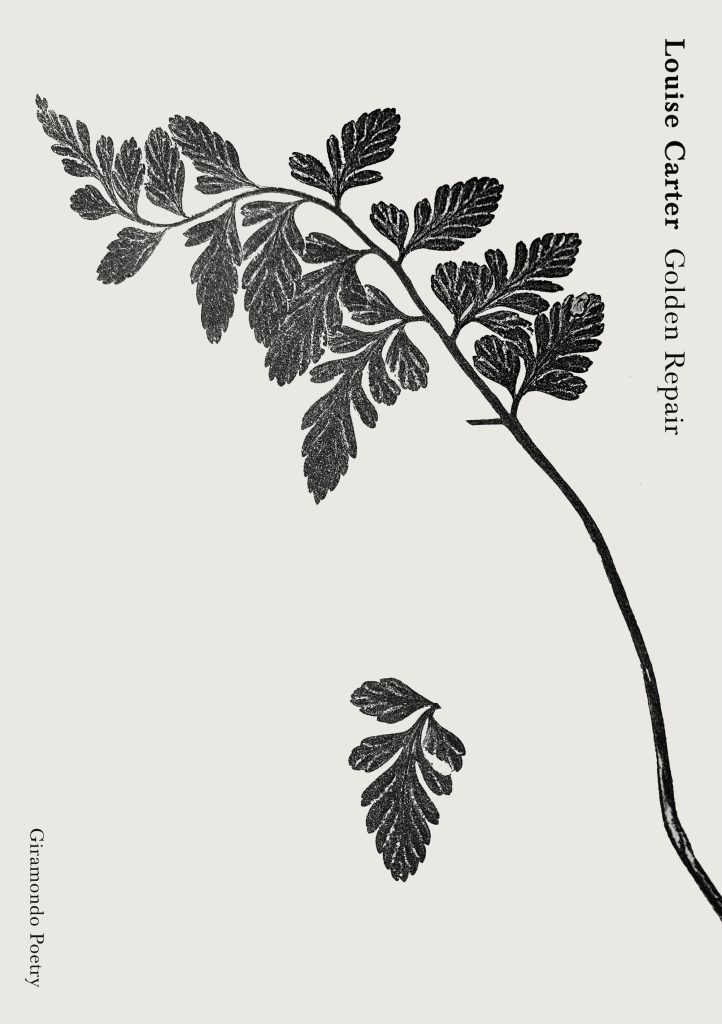Author:
Three vignettes from Paradise Estate by Max Easton
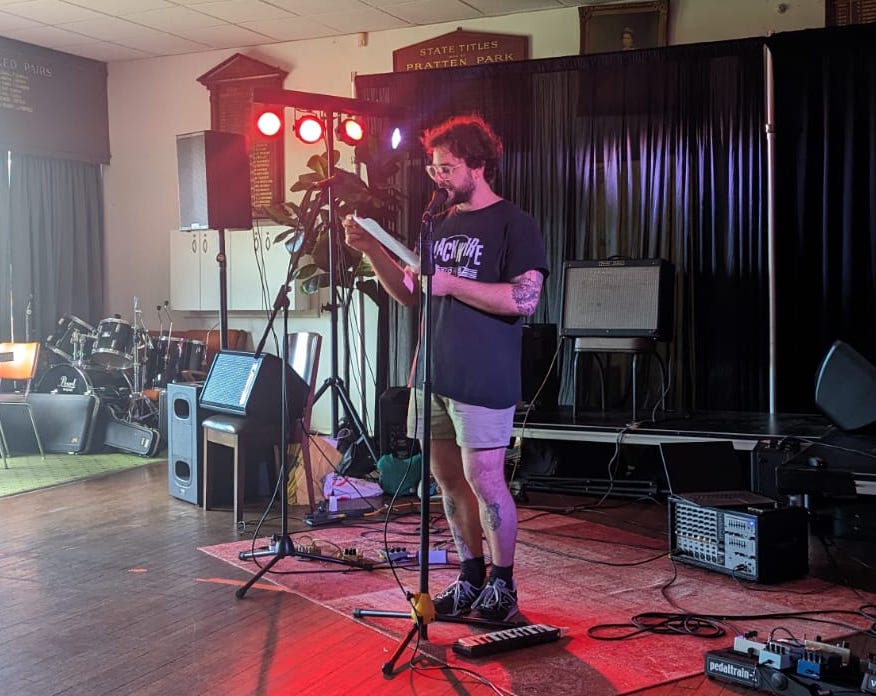
On a muggy, bright and rain-spattered day in November at the low-slung Pratten Park Bowling Club in Ashfield, Max Easton launched his second novel. Almost two years had passed since the launch of Easton’s first, The Magpie Wing, which also celebrated its entry into the world at the bowlo, and which went on to become a finalist for the Miles Franklin. In the nearby suburb of Hurlstone Park, and perhaps known only to Max himself, was the real-life house that the author walked by a few years ago and began him thinking about the book which would become Paradise Estate.
The launch featured live music from local bands Mope City and Zipper, as well as Max reading of six ‘vignettes’ from the pages of Paradise Estate. Three of these vignettes have been published below.
From p.71
Dale bought another round for the old fellas at the Crystal Palace Hotel. He’d been roped into their conversation about former State of Origin greats, and while he usually liked to drink alone, he appreciated this excuse to keep drinking. After some hectoring, Dale told them about the circumstances that lead to him being made redundant (‘who doesn’t wank at work?’ the eldest at the table said, and when the youngest was hesitant to support Dale, the older man yelled: ‘what are you a priest?!’). Dale laughed meekly with these people, who he felt a comfort with, a generation who had never picked him up on his behaviour. To most that he knew, he didn’t seem to come across as ‘likeable’, and it showed. He’d react pre-emptively to the distaste he saw people feel towards him. It made him sensitive and jumpy, and when stretching that energy over a day, he became tired, and gaunt. And that made him look unwell. If he told friends about this anxiety, they’d try to reassure him by saying, ‘it’s all in your head’ but he would reply: ‘I know! That’s the problem!’ Then his friends would run out of patience and advise him to seek ‘professional’ help, which yielded the same advice delivered over several hour-long sessions—only it came with a bill attached, and sometimes a prescription. He was constantly humming with this energy, his eyes darting, his breath short and laboured, trying to take his ex-girlfriend’s advice, that: ‘no one could possibly hate you as much as you hate yourself.’ That had never helped either.
From p.81
‘Nathan, I’m sorry to bring this news to you, but we’ve received another complaint about one of your essays. It’s an anonymous one again, so we’re not sure how to take it. It’s…another plagiarism accusation. If you can call me back when you get a chance…that’d be great. Thanks.’ Nathan knew this one wouldn’t stick. This ‘anonymous’ member of the community going to each of the editorial committees he volunteered his time to, picking apart every word he said and claiming it was someone else’s work. He was no more a plagiarist than anyone else! Sometimes he’d receive a good pitch by a new contributor, reject it, and write it up as his own, but no one could pin that on him as far as he could tell. This complaint suggested that his recent article (criticising the She-Hulk production team for deflecting criticism of the show’s low-quality CGI by claiming it was ‘body shaming’ the titular character) had an identical argument to an essay published years prior (a defence of the Joker movie’s location shoot at a stairwell in Harlem that since became a tourist destination, stating that any critique of a unionised location shoot gave fuel to the push towards all-CGI sets). In the end, the editorial board had to throw out the complaint; Nathan had published the She-Hulk essay under his own name, and the Joker article under a pseudonym.
From p.162
‘What’s wrong?’ Sunny asked a pale-faced Helen, who entered their shed with a bucket of KFC at midday. ‘I went into the church,’ she said, looking overawed, ‘there were nuns.’ When Sunny started howling in laughter, Helen snapped, saying that ‘it’s too fucking cold’ and she needed some reprieve from the winter. Too fried after her all-nighter on Beth’s acid to get any further than the corner of the street, her blankets damp to the touch, shivering through the house, hoping there might be some kind of warm snack inside the church to tide her over until the KFC opened. ‘One of the nuns talked to me,’ she said conspiratorially, starting work on her bucket, ‘she knew about our house. She told me to take a seat. It was really weird.’ Sunny took a piece of chicken and tried to find a deeper psychological reason for Helen’s decision to walk into a church for the first time in her life, but Helen grew impatient, took her chicken away from them and said that no, she wasn’t in need of help from a higher power, because she was ‘beyond redemption anyway.’
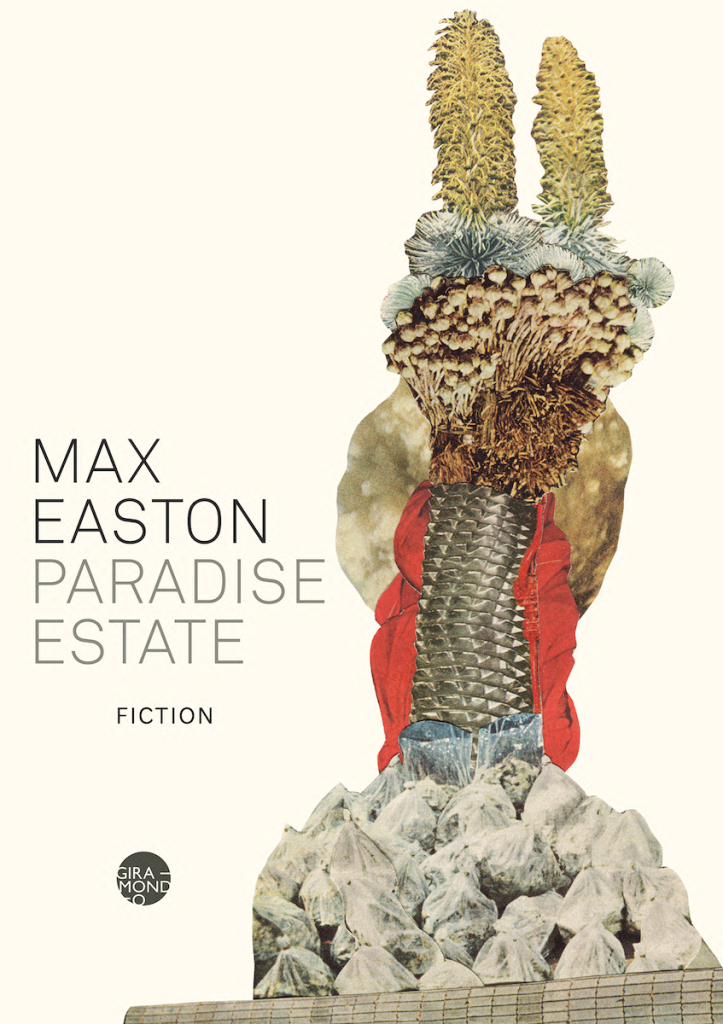
Jessica Au wins Prime Minister’s Literary Award for Cold Enough for Snow
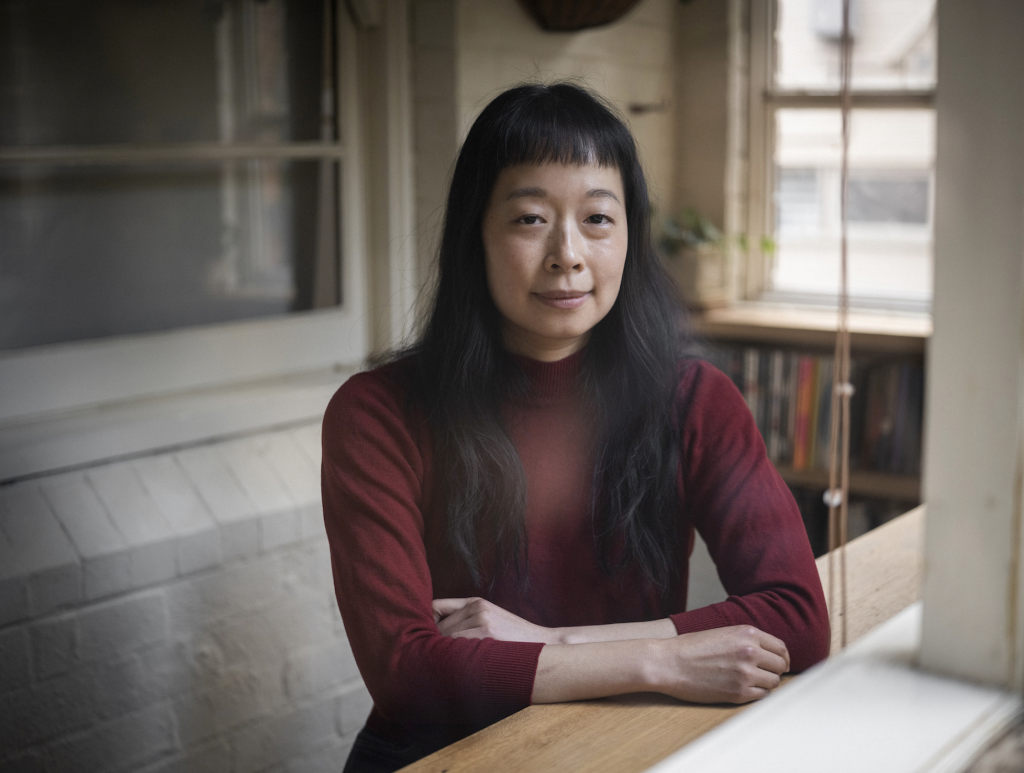
Jessica Au, author of Cold Enough for Snow, has won the 2023 Prime Minister’s Literary Award for Fiction. The announcement was made at a ceremony in November at the National Library of Australia in Canberra.
‘Prizes like these are always a particular blend of luck and happenstance, and I am truly grateful to whatever alchemy has allowed me to stand here tonight,’ said Au in her acceptance speech. ‘I know for sure none of it would be possible without The Novel Prize, without Giramondo, without your support.’
Read the judges’ comments for Cold Enough for Snow:
Cold Enough For Snow relates a short holiday spent together in Japan by a mother and daughter. They live in different countries and the daughter has made a meticulous itinerary, revealing Japan through its natural beauty and through the cultural galleries, houses, rooms, fabrics, places.
Japan itself, with an elaborate and exquisite surface and an elusive interior, is an intricate and sustained metaphor for the relationship between the mother and daughter. As they move through this unfamiliar, cultivated world their own internal lives unfurl. Surfaces are the touchstones in life as well as the place to begin.
The novel is a crystalline technical feat: a series of small portraits and wider scenes, with stillness achieved by capturing arrested motion. The novel is an enquiry into the human heart and how lives are led. Here is the daily embedded in the eternal: here we are in lives past, but also entirely present. Au, by some personal alchemy, uses image the way poets use compression of language. The same poetic is applied to her choice of words. The clarity of language suggests contemporary Korean novels and has an unusual gravity.
Au’s writing has a quietness, a sophistication of expression emerging from a hum of silence and thought. It signals a new direction in Australian literature, intricately structured and with a flow and reach that, like all remarkable writing, is without boundaries.
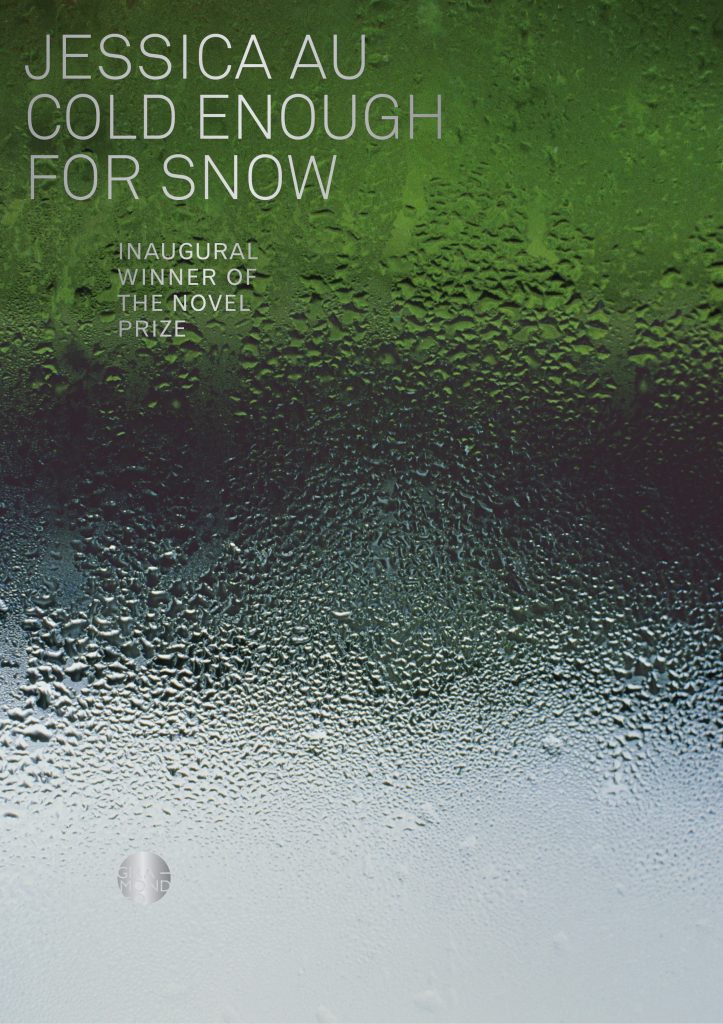
Transcript: Jennifer Mills’s launch speech for The Idealist by Nicholas Jose
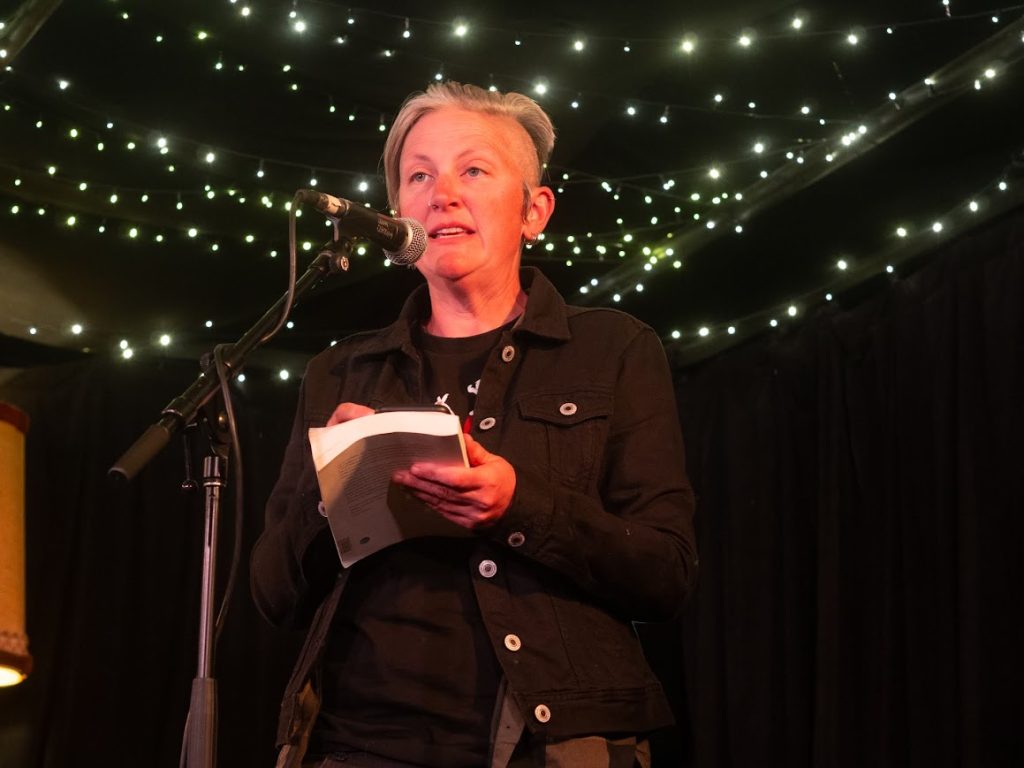
The Idealist by Nicholas Jose (September 2023) was launched in Sydney at The Cross Art Projects by Julia Leigh, and in Adelaide at The Wheatsheaf by Jennifer Mills. Read a transcript of Mills’s speech below.
I can’t remember when I first came across Nick Jose’s work as a reader, but it would have been before I knew I was a writer. I might have picked up a copy of Paper Nautilus from a second-hand bookshop, or maybe it was on my mother’s overflowing shelves. That book made quite an impression on me, presenting a version of this country I hadn’t encountered elsewhere.
I turned to his work when I went to Beijing on an Asialink residency in 2010. I looked to his words to help me make sense of that country and to unpick some of the intricacies of Australia’s relationship with China.
He is a serious writer with an internationalist outlook that is not extractive – a rare thing – but eternally curious. There are writers who close the door behind them, and writers who open doors for others as they go. Nick Jose is firmly in the latter category, very generous with other writers, I know he has done a great deal for his students in particular.
His work often has a sense of mystery that shows his generosity also extends to readers. He’s not rushing to solve the world for us, or explain it, but opening our eyes to its wonders and complexities. He has a real gift for character, a sensitivity to emotional nuance, and importantly a moral spine. He also has a really intelligent approach to narrative structure that I particularly love.
The Idealist is no different. It’s a novel about East Timor and a particular period of history, the independence struggle at the turn of this century. But it’s also a novel about complicity, the impossibility of doing right within a geopolitical context characterised by greed, dehumanisation and self-interest. It takes the shape of memory in action, moving gently through associations, with multiple points of view. There is anger here, and doubt, and horror, but there is also a moral core, a sense of the novel as doing useful work in the world.
The war in Gaza has been front and centre for the past few weeks, overlapping the failure of the Voice referendum. When you write for a living it can sometimes feel like art is inadequate to the task of politics, to the task of life on Earth. We need action – diplomacy and international co-ordination and a ceasefire. We need treaties, truth, and an education about whose country this is. But we also need voices of care and compassion, thinkers who are able to set these difficulties out before us and invite us to ask ourselves, what would I do? Whose side am I on, when would I take a stand?
So this book is incredibly timely, and incredibly useful. And it’s beautifully written, of course. That goes without saying. I am so pleased to be launching it tonight. Please raise your glasses to The Idealist, and to Nicholas Jose.
— Jennifer Mills, 25 October 2023
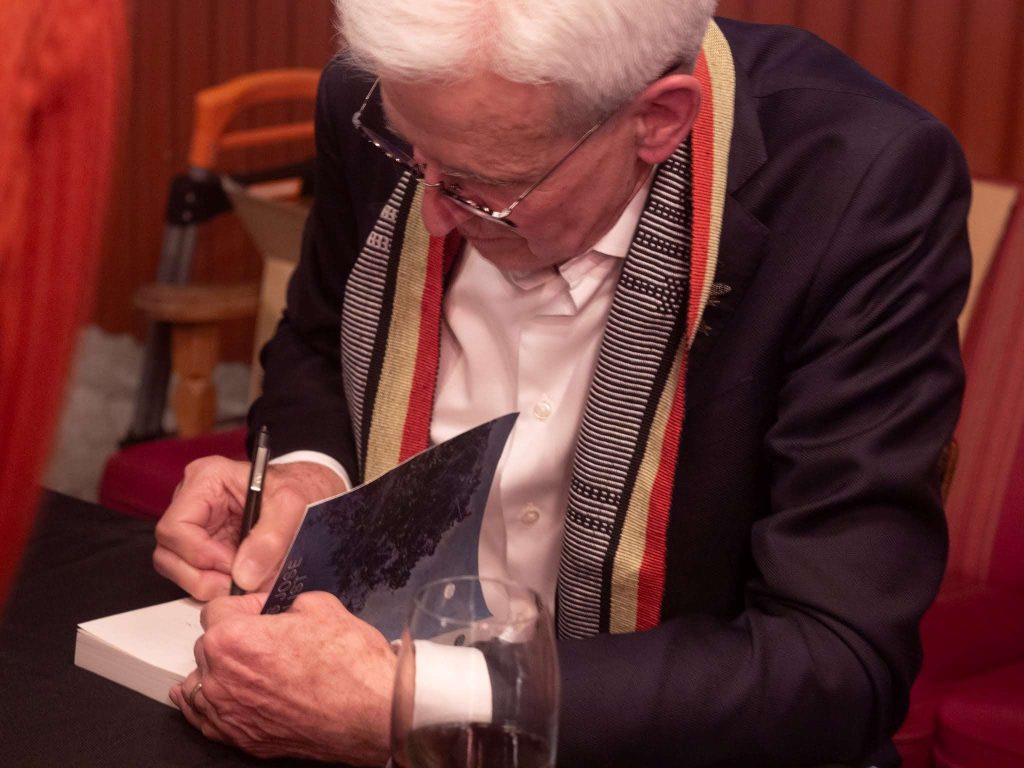
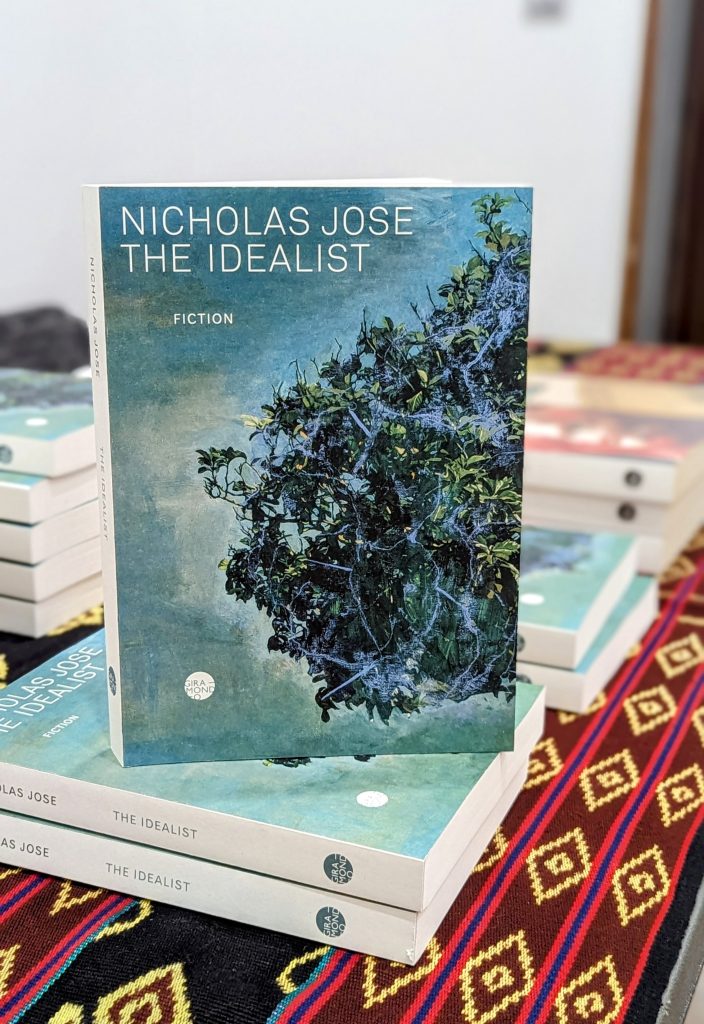
Cold Enough for Snow and Harvest Lingo shortlisted for Prime Minister’s Literary Awards
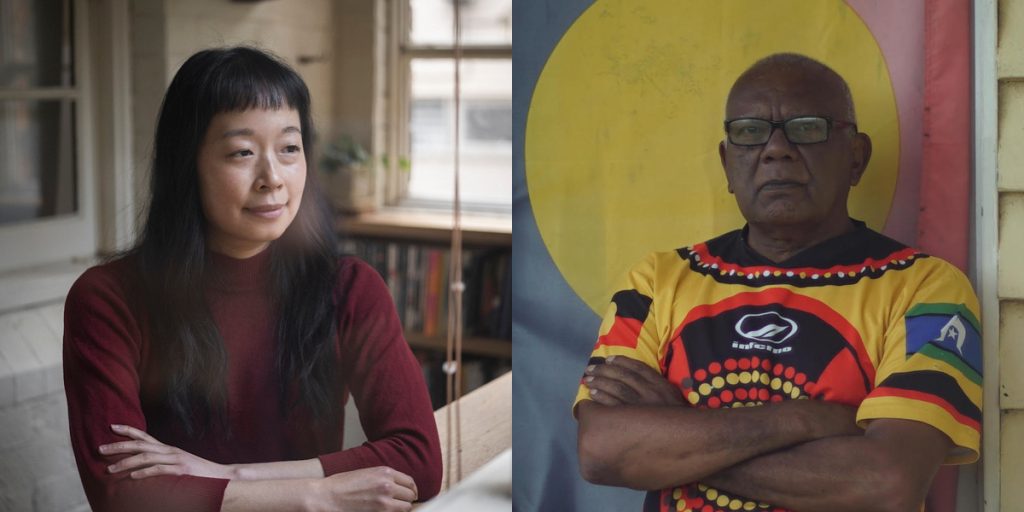
Jessica Au’s novel Cold Enough for Snow and Lionel Fogarty’s poetry collection Harvest Lingo have both been shortlisted for the 2023 Prime Minister’s Literary Awards. Each book is already the recipient of major Australian prizes in literature.
Fiction category: Judges’ comments, Cold Enough for Snow:
Cold Enough For Snow relates a short holiday spent together in Japan by a mother and daughter. They live in different countries and the daughter has made a meticulous itinerary, revealing Japan through its natural beauty and through the cultural galleries, houses, rooms, fabrics, places.
Japan itself, with an elaborate and exquisite surface and an elusive interior, is an intricate and sustained metaphor for the relationship between the mother and daughter. As they move through this unfamiliar, cultivated world their own internal lives unfurl. Surfaces are the touchstones in life as well as the place to begin.
The novel is a crystalline technical feat: a series of small portraits and wider scenes, with stillness achieved by capturing arrested motion. The novel is an enquiry into the human heart and how lives are led. Here is the daily embedded in the eternal: here we are in lives past, but also entirely present. Au, by some personal alchemy, uses image the way poets use compression of language. The same poetic is applied to her choice of words. The clarity of language suggests contemporary Korean novels and has an unusual gravity.
Au’s writing has a quietness, a sophistication of expression emerging from a hum of silence and thought. It signals a new direction in Australian literature, intricately structured and with a flow and reach that, like all remarkable writing, is without boundaries.
Poetry category: Judges’ comments, Harvest Lingo
In this powerful new collection, Lionel Fogarty demonstrates that his many decades of writing and publishing poetry have not diminished his political bite or poetic power. Across themes of love and Country, domestic and international politics, the personal and interpersonal, Fogarty does not shy away from interrogating all facets of life as observed and experienced by an Indigenous Elder and a life-long activist.
Often, with the sense of an outsider or ‘intruder’, Fogarty has created a collection that is dense and multilayered, veering into abstraction that intensely evokes the absurd realities that Indigenous people are asked to face living in colonial Australia.
Fogarty writes with a radical inversion of the English language that turns the coloniser’s tongue in upon itself to create poetry that challenges the reader in pursuit of political liberation. His work is singular and uncompromising, it is often difficult, but it has a lyrical form and a syntactical uniqueness that flows with rhythm and purpose. Harvest Lingo is a book of intense commitment and power.
The winners will be announced on Thursday 16 November at the National Library of Australia in Canberra.

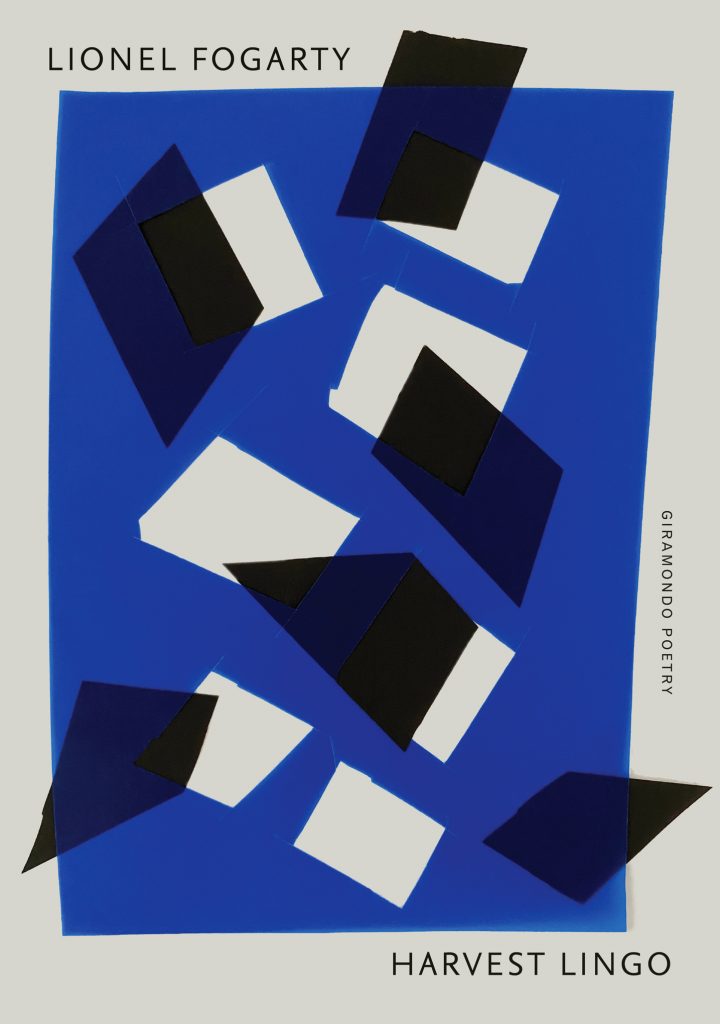
Max Easton: a note on Paradise Estate
Sydney-based author Max Easton reflects on Paradise Estate, a book which occupies the same universe as his Miles Franklin longlisted debut, The Magpie Wing. Paradise Estate was released in October 2024.
The writing of Paradise Estate started on the week of The Magpie Wing’s launch in December 2021. A few people had asked if I was working on anything, and it was easier for me to claim that I knew what I was doing than to admit to how lost I felt. ‘I’m planning a book set entirely in 2022,’ I said. (That week, I’d gone for a long walk around the neighbourhood and passed a house in Hurlstone Park, signposted with For Lease signs belonging to three different real estate companies, flanked on each side by apartment blocks). ‘It’s set in a sharehouse with no privacy, on the edge of a suburb being swamped by development,’ I continued. ‘No it’s not a sharehouse novel…it just features six people cohabiting in their thirties because that’s the way it is now.’ And while at the time it all felt rushed, and hurried, and motivated by social anxiety: I look back at the final edits this morning, feeling like it all went to plan.
Of course I’ve embellished the hastiness of the book’s setup. I had been thinking a lot about years of historical significance. It was on my mind since the writing of the Barely Human podcast (isolating points over a fifty-year history during which countercultural action slipped into subcultural practice) and was sparked again by The Magpie Wing’s timeline, when it hit the 2010s and each year seemed to blur into the other.
Going into 2022, I thought it would be fun to explore the meaning of what felt like potentially another miscellaneous year…but then things kept happening. A war took the world’s attention and instigated the start of a recession; extreme weather events were laid one atop the other; the pandemic continued despite our wilful ignorance; the housing crisis finally became a discussion point; and governments changed hands with no signs of curbing any of the above. I tried to take notes and wrap a narrative around all these events, to find parallels by way of allegory, to satirise the process itself as I went, allowing the march of 2022 to dictate the progress of the book. It was much more of an experimental process than I imagined, and it took a lot of work to bring it into some kind of order. Finishing a book in 2023 that was all set in 2022 has done all kinds of weird things to my perception of time, and I wonder if that’s a personal effect, or something that will flow on to the reader.
I should mention that Paradise Estate picks up a timeline shortly after the end of The Magpie Wing via the character of Helen (that’s a sophisticated way of admitting this is more or less a sequel). This one is written so that you can read them in either order, and I think it’d be an interesting way of parsing time, going from the fine-angle lens of Paradise Estate’s 2022 to The Magpie Wing’s twenty-five year history. It seemed to me that sequels aren’t really a done thing in contemporary literary fiction, and while I’m not sure what the wisdom is there, it seemed like every reason to write one.
Thanks to whoever takes the time to read Paradise Estate, and to everyone who helped bring it through to completion.
— Max Easton, August 2023
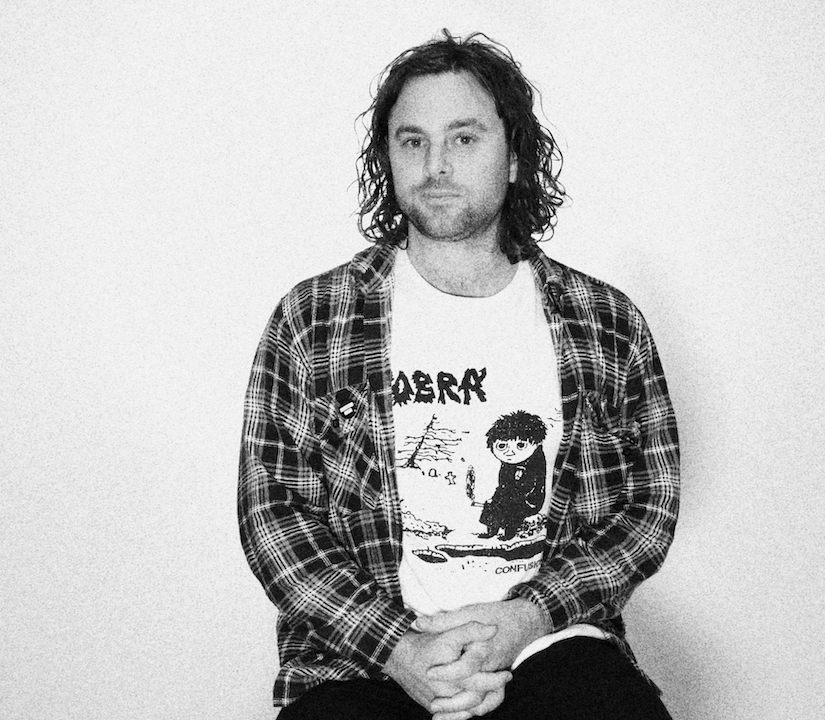

Lionel Fogarty’s acceptance speech at the Queensland Literary Awards
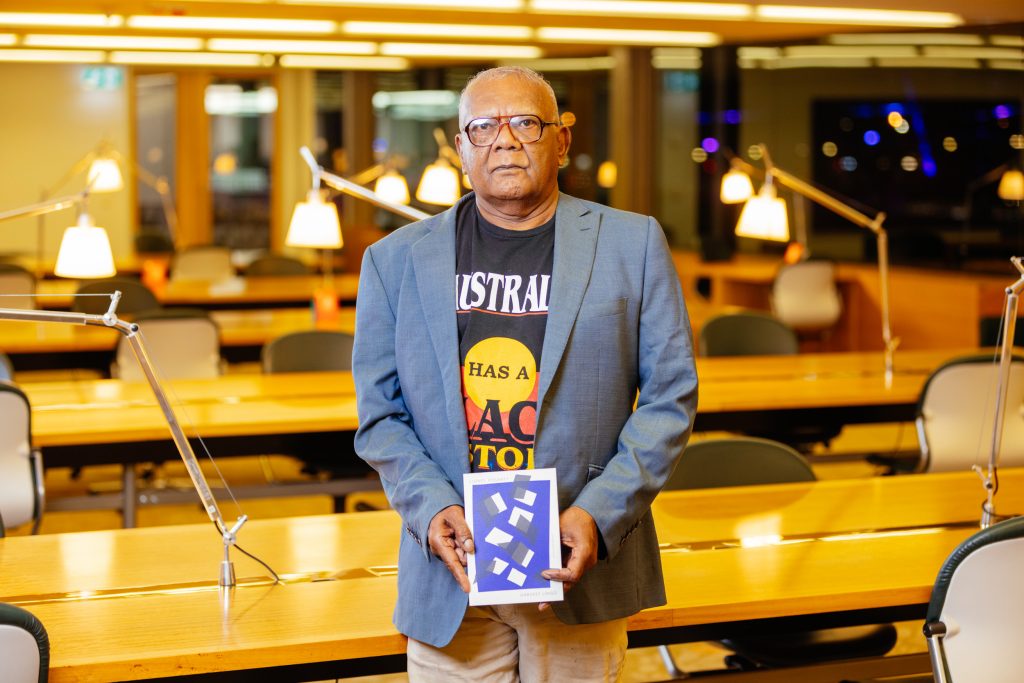
In September 2023, Murri man and leading Australian poet Lionel Fogarty was announced winner of the Judith Wright Calanthe Award for Poetry for his collection, Harvest Lingo. Below, watch a recording or read a transcription of Fogarty’s acceptance speech, which he delivered in person on the night, as well as a new poem, ‘Earth writes back to forward’.
Been a long while for me to get Queensland recognition for my word works that shows art, shortlisted here and there hey
I was a bit hesitant yet where respect gives to someone like the illiterate concentration place I have survived
I accept this award as a gate for more, cause my next story poems are written as better to present to the hoped state peoples institutions
Like who did not get published or not won
Are absolutely superior to me and my unions:
But I accept the award as the money will help me get things I need for more hours songs and the house and dance and stories written from, real appropriated in accordancy
Oh all the mutual harvesting linguists respect as approach do change
There’s been many a friend that I appreciate getting me to this time in space, those who gave solidarity when I wrote well once. I have an original writing worth $1,500 dollars to the state library dem still have it, after no neo or colonialist gave nothing in over 150 years, I keep thinking I won an award
Celebratory for a change to say I can write about overseas concern for our struggle Aborigine Aus
A written published needs entwine impartial as poets are coordinations to more poets who now appreciate in my new works are again businesses must grow engaging, so thanks Copyright Agency art and the judges for again seeing my dedication once more resemblance and rememberance a book as a gap, but which sound art touch feeling of laugh, when sad jail bad days
You all will known clarative general conversation makes the huge higher education being personal when things not political shows poetries usage as power in mind, heart and ran out of the dance of polices .
But dreaming very hard to be written aloud as the facts are timelessness that’s deeply why like poems when understood. When land, cultures begin taken away and not given back, theirs is a fighter fight wars are words to bring down oppression
Life in colour holds so much tongues, comforting, sensitive voices with the modern cultural talk as written yet still needs tranquility sensationalism in its complexion. House me now to Queensland literatacy as to inspiration black young Australian persons.
But how now when invasionist economical words of sell your soul to the publishers.
There’s lots of stages in the subjection to do
The struggle as challenge to preform more old about laminating for the young workshop role a moment for times to began ultra anti war saying the planet is a first class pen but painting uniqueness completion
United Nations world wide as to combining indigenous written language to garden growth
My intellectualcame by learning watching holding on to gifted memories not just my family, so triple secrets as relentless anybody and everybody sit to judge for better leeways
But first nation’s networks are I was I was always identified within
Still thanks to the hidden panel for the decisions made by you, must of been different cause I’m a different writer I form
Actually I did not want to be chosen, for all my books really this book harvesting lingo as a witty front line bringing a lighthouse. Writers change things not so much the judgement on the work, but when an action off arts brings solutions
In my conclusion, there is not the winner pride in my life’s cost to write on an art words to pathways
I servant to Ngunda postion to wise live power and equally being not a subjective to any subject society
Yet we all routines to find a common discipline to over one injustices
Recognition is not a show off thing
It’s the importance
Looking out, I am after to dominate this function authoritative experiences Haha
Mmm by my define win
My Mums and Dads of ancestors, dead and alive would be proud of my meeting people without face on face
But in the round fire camp conform as acceptable as outspoken I am
Articulate this thing done for a flower to grow trees, memory of militants black red and golden
Star butterfly social gathering
Yes give it a lingo and go by while in print
Yoway everybody
Go buy it
19 August 2023
Earth writes back to forward
First family had older men and women
Grandmothers where will them be without grandfathers
Love telling story word both ways
So it was hard on each side
Age made a travel of memory
Marriage big land sea coast
Bed rooms house made the eyes speak one on one
Walking on different oath gave a different longline face onto grandmothers head lives
Now only us, young blood belong them lives
There sound song to change are gone
There music dead voice is are gone
Now we gonna be grandmothers now have we become grandfathers
Grandmothers sat once around fire
Paint now the story, after dead been dead
Now speak the living
Mature the country mature young mind
Mature the country mature’s our heart
Whisper land as said country needs and hand legs bodies to network blood heart
The country everyday writes back
The country everyday read the living
That country heart stopped cause value taken out off the desert people’s land as dance song singing in line as a sand
Them children who did not go school, denied country air
Life’s age old began small aft now how old matter when wise peace unity into a bodies
Freelance the costed creative explorers
Choices powers in mind
Let me sleep without heavy thoughts
Let me awake without a headache
Leave my waiting on roofs for fly by plane to see + smell
Choice a writers to lovers who lose all country as law, rules obeyed
All country’s have parents upbringing
All country’s space a same bush
Rivers wash dish life build
The sea as to be seen as tree’s first family are the governments
First parents are the powers realises town winner class which as matters

Alexis Wright wins the inaugural Creative Australia Award for Lifetime Achievement in Literature
The acclaimed Australian author Alexis Wright has won the inaugural Creative Australia Award for Lifetime Achievement in Literature.
Write Creative Australia: ‘Alexis [Wright] is an author of ground-breaking works across a number of literary genres. She is a highly decorated and awarded author who writes extraordinarily important work that sits in your consciousness. Her novels interpret the past, present, and future tense and challenge the readers’ comprehension. She has changed how we think about the meaning of storytelling and time.’
Wright’s award-winning works include the novels Praiseworthy, Carpentaria and The Swan Book, and the collective memoir Tracker. Praiseworthy, her most recent book, won the 2023 University of Queensland Fiction Book Award, with the judges describing it as a ‘simply astonishing’ novel that combines ‘farce, satire, tragedy, the colloquial, myth, pun, repetition, elegy, and the epic’.
‘I feel deeply honoured and really humbled to receive this award,’ Wright told ABC Arts of her Lifetime Achievement. ‘But I also want to say, I’m not finished yet. I’ve got a lot more writing to come.’
Watch the full ABC Arts video profile of Alexis Wright on YouTube.
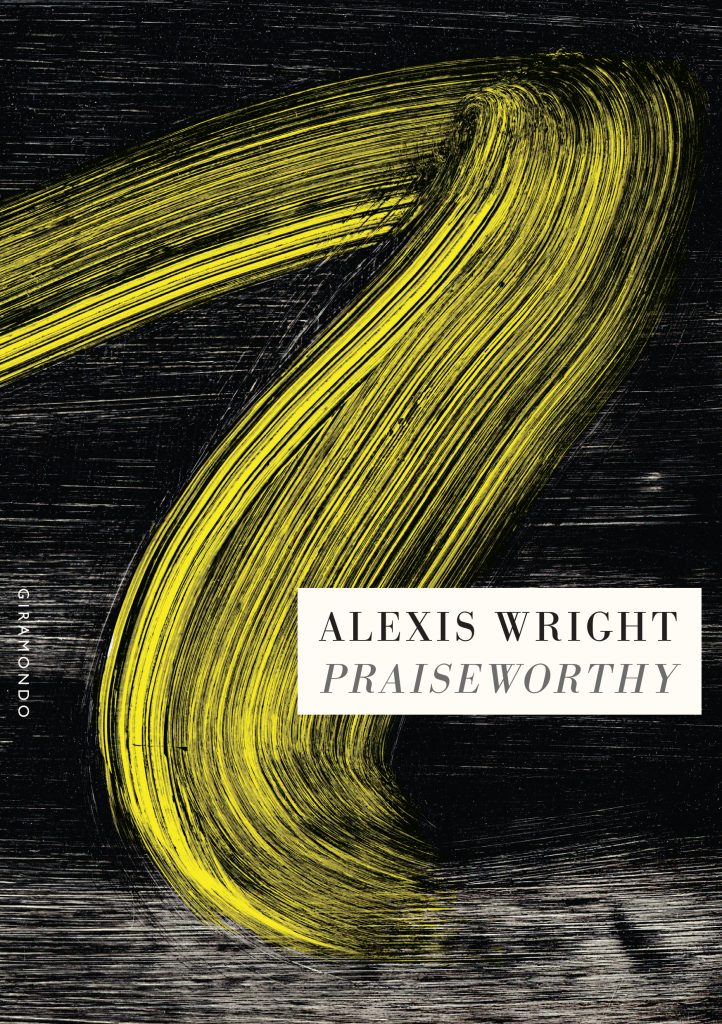
Nicholas Jose: a note on The Idealist
Acclaimed novelist Nicholas Jose reflects on The Idealist, his first novel in almost two decades. Set during the independence movement in East Timor at the turn of the century, it continues the themes of his previous novels in exploring Australia’s place in the world in times of conflict, and the changes wrought in the lives of individuals who are impacted by them. The Idealist was released in September 2023.
This one has been a slow burn. I still have the vinyl record of the Fretilin song we sang along to in Canberra backyards in the late 70s. In 1998-99 I was obsessive about following the events leading up to East Timor’s independence referendum, trying to decode what was being said and done. Then I happened to be in Washington DC for Shock and Awe, the attack on Saddam Hussein. We were told to get anti-radiation tablets just in case. We found one of the last available packs in a neighbourhood pharmacy in Georgetown. In the end it wasn’t needed but I keep it as a souvenir. I saw at close hand then the difficulty for Australia in supporting a powerful ally when our interests diverge. It got me thinking. There were more questions than answers about East Timor and the story just kept growing.
A lot has been written about East Timor and Australia’s role in what happened – evidence of a guilty conscience. But very little fiction. Timothy Mo’s The Redundancy of Courage fictionalises the events of 1975 when Indonesia invaded. His wonderful narrator Adolph Ng gives us one of the great quotes: ‘There’s no such thing as a hero – only ordinary people asked extraordinary things in terrible circumstances – and delivering.’ Luís Cardoso’s The Crossing is another fine book. As Jill Jolliffe says in her foreword: ‘There are many crossings…’. Not everyone is an idealist, but some are. It’s a story I couldn’t let go.
I’m interested in what happens when the world challenges our deepest attachments, as is the case with Jake and Anne in The Idealist. Another novel that inspired me was Giorgio Bassani’s The Heron in which the protagonist drives through his watery region of Italy trying to piece things together. I transpose that driving to places that are familiar to me, in the Adelaide Hills and on the peninsula further west. Where do those winding roads begin and end? Simple enough, but complicated by curves of time and space.
Timor-Leste celebrated its twentieth anniversary as an independent nation in 2022. A new generation is writing their story now, with the future as a destination for hopes and dreams. It can be a happier ending. Let’s help with that.
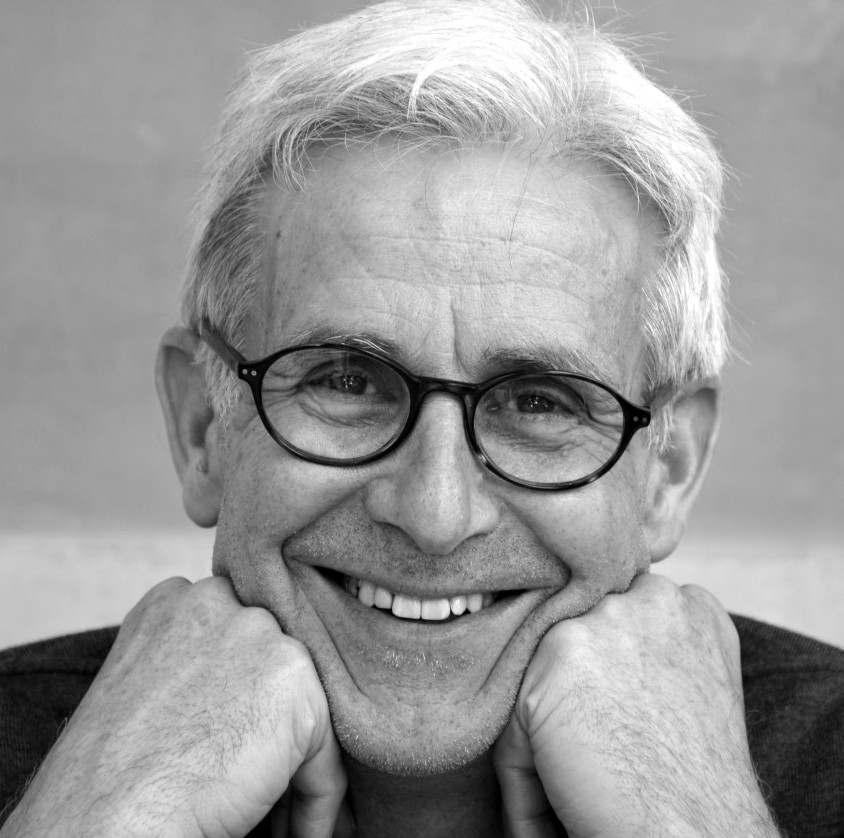
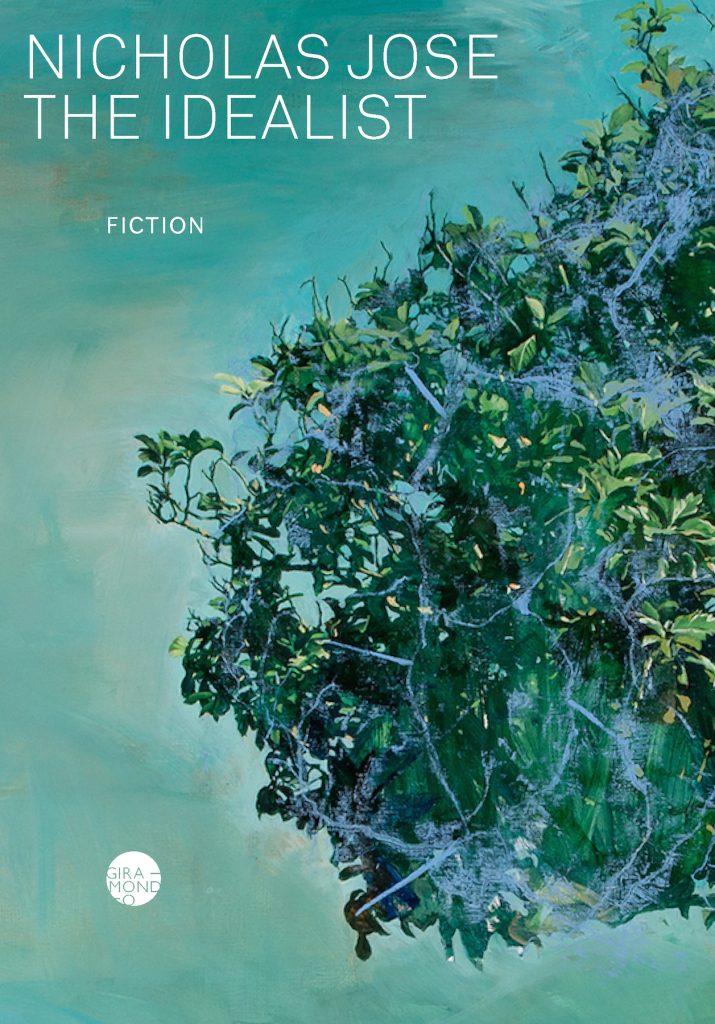
Amy Crutchfield: a note on The Cyprian
Melbourne-based author Amy Crutchfield reflects on The Cyprian, her debut book of poetry, in which she interrogates the nature of love in all its forms. The book was released in September 2023.
That we’ve broken their statues,
that we’ve driven them out of their temples,
doesn’t mean at all that the gods are dead.
— ‘Ionic’ by C. P. Cavafy
To Homer, Aphrodite, goddess of love, is ‘the Cyprian’ and it was probably through Cyprus that Aphrodite first entered Greece. This book bears the goddess’s name, but perhaps it would be safer to dedicate it to her? Passionate and vengeful, if you don’t give the Olympians their due, they take it.
Although I didn’t set out to write a book about love, it is love that connects these poems: romantic, sexual, mythical, familial, historical and human. Love for the living and love for the dead. Although the poems also venture away from the centre; towards love’s borders, lawless places, and across those borders, to situations where love fails us, or we fail love.
Aphrodite has dozens of epithets. They allude to her powers in connection with sex, fertility, sex work, beauty, birth, seafaring and war, among other things. Each epithet reflects an aspect of the goddess or a facet of her aegis, being her sphere of influence. What struck me as I studied Aphrodite’s epithets was their range, and the consequent array of situations in which people must have turned to her.
The book has five parts, each is named after one of these epithets, and the poems within each part can be seen to congregate thematically around the epithet in its title.
The contemporary influences on this collection are many. They include singers and songwriters as well as poets, and I have no confidence I could accurately list them if I tried. However, as a needleworker uses backstitch, these poems often move back to move forward. A short way back, to, for example, Ernest Dowson’s ‘Cynara’, or Rilke, and further back also, to Sappho, Catullus and Homer.
In the quote above, Cavafy suggests that the gods may not be dead. Others have suggested they are only in exile. In any case, this book is not named for an imaginary figure from myth, or a character consigned to history, but rather the force she represents. A force which persists – fierce, intractable and undiminished.
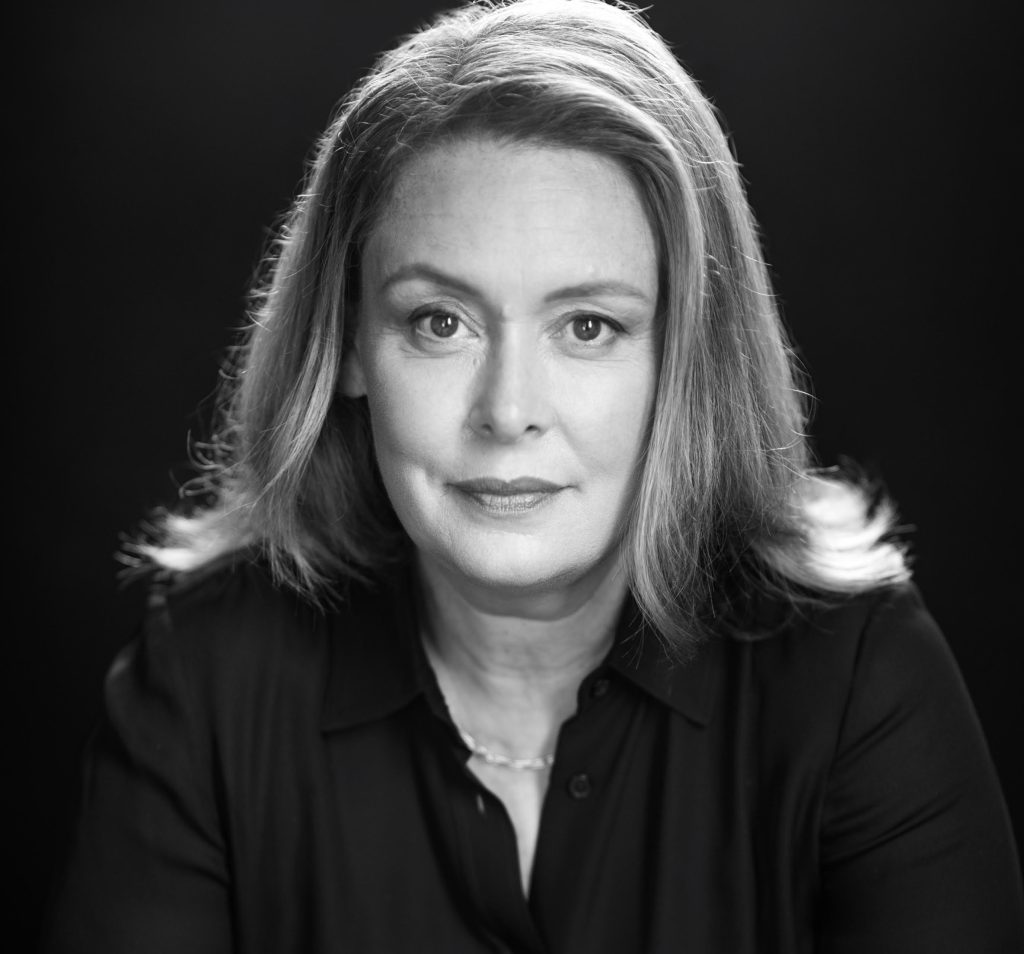
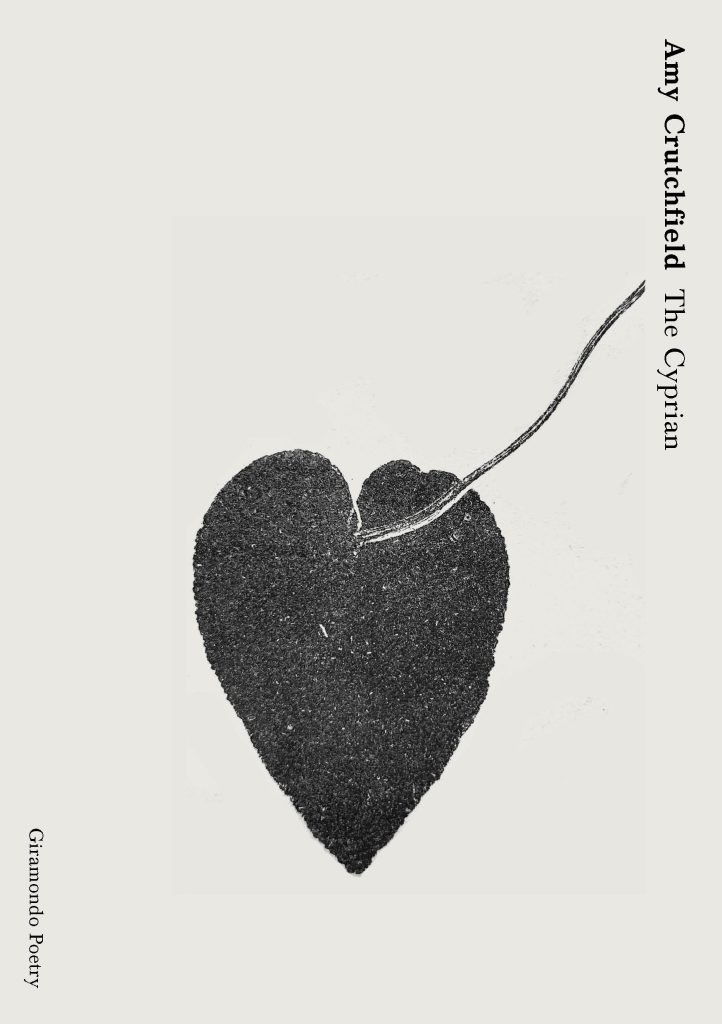
‘A Narrow Field’: a poem from The Cyprian by Amy Crutchfield
We feature here a poem from Amy Crutchfield’s debut collection, The Cyprian (September 2023), a book that interrogates the nature of love, in all its forms. The collection is composed of five parts, reflecting different aspects of Aphrodite, the goddess of love and beauty. ‘A Narrow Field’ is the final poem of the fifth part, which is titled ‘Aphrodite Genetyllis – Protectress of births’.
Open, the coffin shocked me.
I had thought that we were more disposed
to keep things hidden.
Thought – I did not tick this box?
In any case, you looked well
wearing the clothes I’d chosen –
light, comfortable linen, a touch of colour.
As per the regulations
there was no one there.
Still, the choice had vexed me.
You wore your hair as a small cloud
with the promise of showers
and I patted it as a child might
size up a stick of floss.
I saw you as a great painting
recovered from a cave or cellar
with me the expert
able to recognise the original.
Bohr said that an expert
is a man who has made
all the mistakes
in a narrow field.
And probably I have made
mistakes on you.
Inside the coffin, a sable curtain
and two pink buds,
my infant fists,
tangled inside it. Tangled
in that way babies have
of grabbing, and I mean really
yanking, their mother’s hair.
The trick being
to stay calm,
even as a tear pricks.
So the baby knows it is not a game
which would only lead to more yanking.
The trick being to stay calm
as you unsnarl yourself
hair by hair
from their grasp.
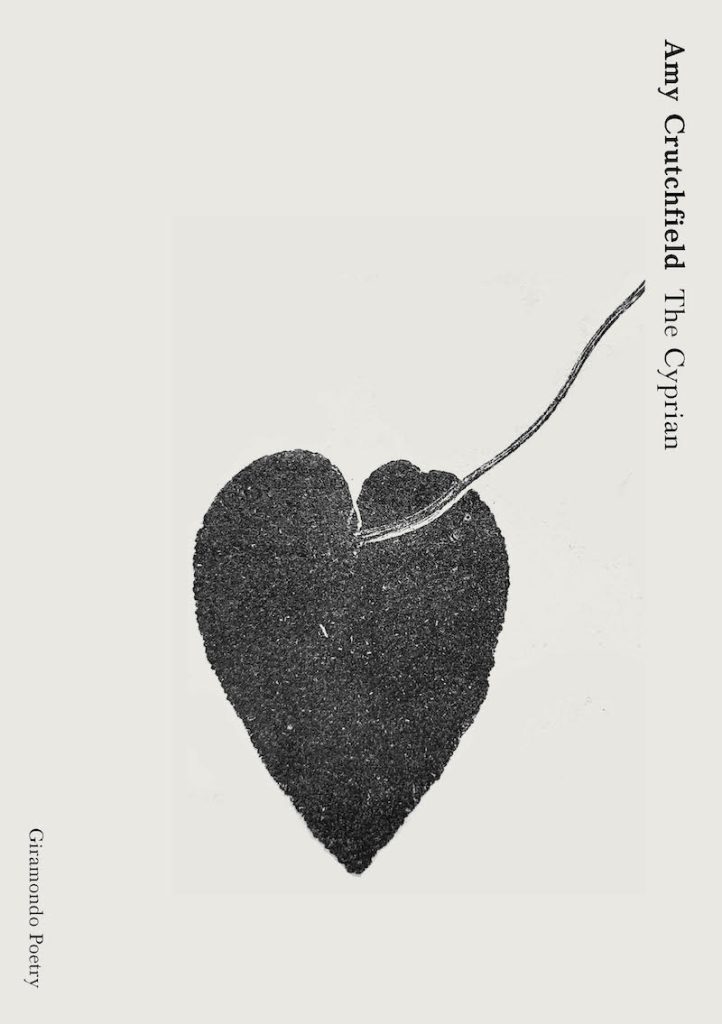
Transcript: Marion May Campbell’s launch speech for Chinese Fish
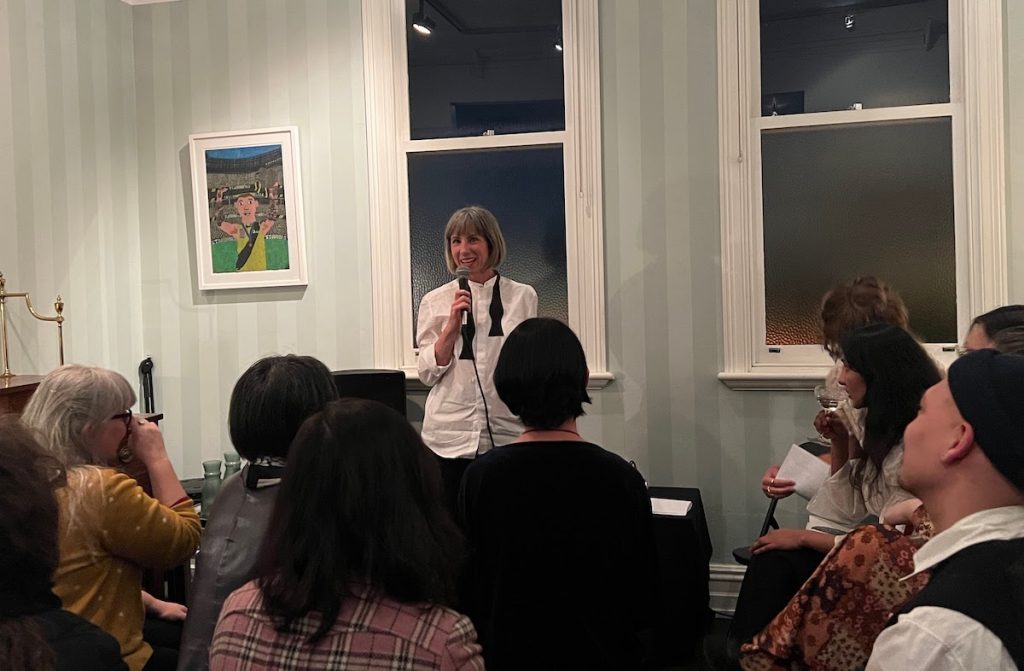
Chinese Fish by Grace Yee (June 2023) was launched at The Alderman in Brunswick East at a sold-out evening event. The launch included readings by Yee, as well as from fellow ex-Aotearoa poets Alison Wong, Saradha Koirala, Xiaole Zhan, romesh dissanayake, and Manisha Anjali. Poet, novelist and academic Marion May Campbell wrote the launch speech, which was delivered by Lisa Gorton on the night. Read a transcript of Campbell’s speech below.
Chinese Fish is a brilliantly devised, comic feat of cultural resistance; a fantastically polyphonic verse novel majoring in riotously funny and heartbreaking ways, the minoritised experience of three generations of a Chinese family, who in the 1960s migrate from Hong Kong to Aotearoa / New Zealand, or, as white Australians hypocritically used to joke, the land of the wrong white crowd.
Its most intense emotional charge comes from the struggles, triumphs and resistance of the female characters. There’s the doubly silenced Ping, crushed and exploited both by internalised patriarchal oppression, emotional neglect by husband Stan, and the pervasive racism, both blatant and casual from the host country, and there’s her feisty Hong Kong-born, first child, Cherry, whose coming-of-age story the work also intermittently charters. But Stan and Ping’s other children, Joseph, Lenore and Starlit, a host of minor characters, co-inhabiting in-laws, neighbouring kid bullies and friends, also emerge vividly alive through the narrative fragments.
The economy, dramatic verve and imaging give these fragmentary story-worlds an almost hallucinatory intensity. Uncompromisingly, Grace builds this tessellation of poetic and dramatic fragments into an ever-more resonant mosaic, allowing the reader to circulate in freely imaginative participation in the gaps. The work is all the more brilliant for eschewing the conventional lyric and also for being free of polemic and interpretative commentary. The voicework performs the scenes for us throughout, setting into friction the dynamic exchanges between family members, in their Cantonese-inflected English, (with interruptive Chinese characters), plunging us directly into each newly unfolding stage of their material and white-bread, milk-tea cultural accommodation to suburban middleclass life, with the virulently racist Sinophobic journalistic diatribes, slogans and casual slurs, playing in their grey font like a gruesome drizzle through the text.
It’s an ingenious mode of poetics driving the work (in all its experimental graphic, spatial, and narrative dimensions) and it’s all the more remarkable, that despite the jamming of speech acts from a huge range of genres, with their culturally saturated images, ads chanting the seductions of new domestic appliances, or the visceral intersplicing of body events in pain, danger and pleasure, the multiple stories emerge with a secure dramatic contour.
Through the voicework, Grace unfolds the often ingenious and sometimes desperate ploys of the family’s adaptation to a frequently hostile culture, with passing and subterfuge working as oblique resistance. Grace’s satirical brio, her delightful riffs on the absurdities of masculine behaviour, for instance, her deflating laughter before injunctions to aspire to conventional feminine beauty, and her complete eschewal of sentimentality before even acute suffering – all sustain the reader’s empathetic connection as they participate in the community.
The painfully edged comedy of daily survival is pervasive, though. A major motif that runs through the verse novel’s seven sections is the rat-plagued fish and chip shop, which is the economic engine driving the family’s quest to thrive:
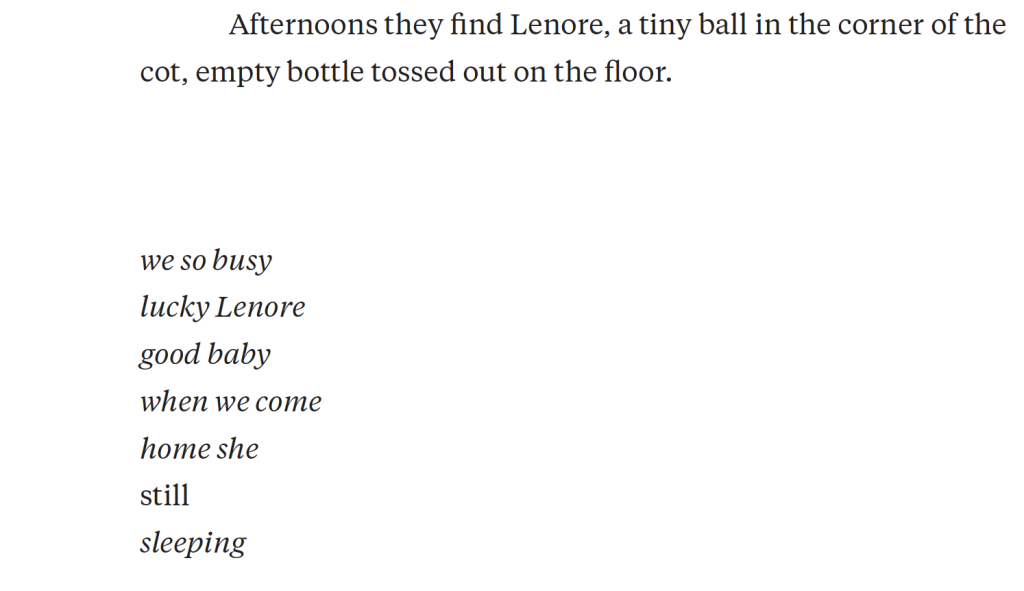
Or we could look at the way the cinematic montage swoops us to the centre of sacrifice and pain: after a wonderfully abbreviated sequence of who is doing what in the household, we find Ping (whom we know from Grace’s vivid and succinct evocations to be clever and beautiful), throttled into illness by endless hours of enslavement over the fish, chip, and sausage vats, on top of all the domestic labour with the big extended family, venting her sorrow regarding her faithless husband. (p.50) And later (p. 87), her rage emerges: you dead man you dead man you dead man.
But this rage is countered by the delightful evocation of Cherry’s coming-of-age, her experimentation with Punk gothic rebellion with her superb friend Delia, and her sampling of Pākehā boys’ attractions.
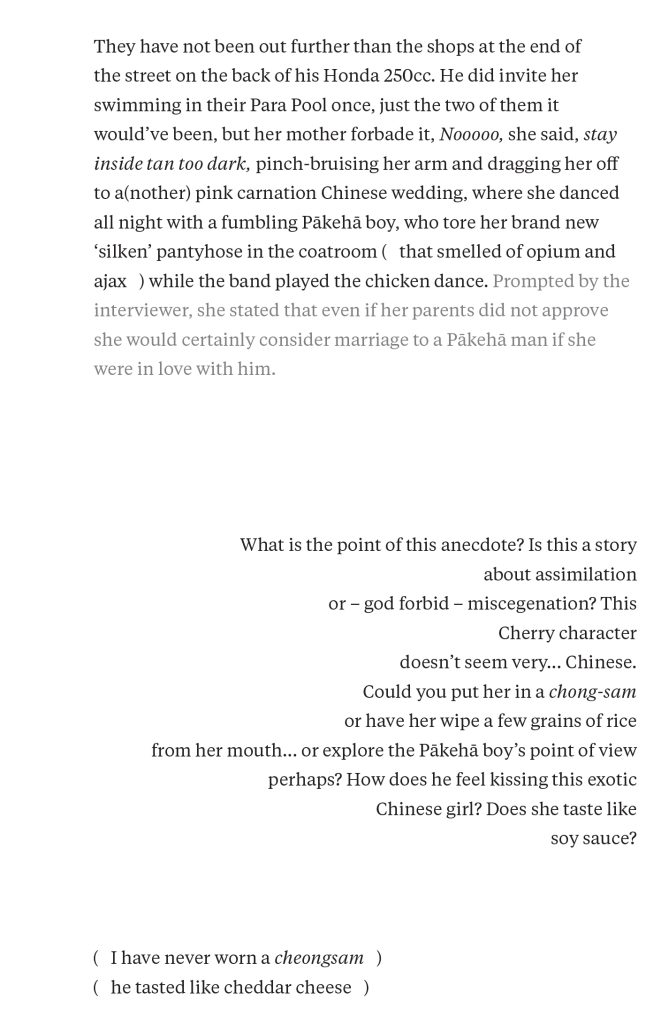
How about Grace’s parodic verve here, poking her tongue at the persistent orientalism corroding the ‘politically correct’ veneer. Here’s nothing like laughter to undermine the power of the would-be assimilationists and to disarm virtue-signalling Anglo-Celt post-colonialist critics.
It’s impossible in a few minutes to account for the extraordinary richness of this masterwork with its myriad story-worlds, bestowing us a host of gorgeously flawed and entirely engaging characters.
Chinese Fish is a great artistic triumph that I do hope you can fully celebrate tonight, and that deserves all the critical accolades it will surely attract.
Congratulations Grace!
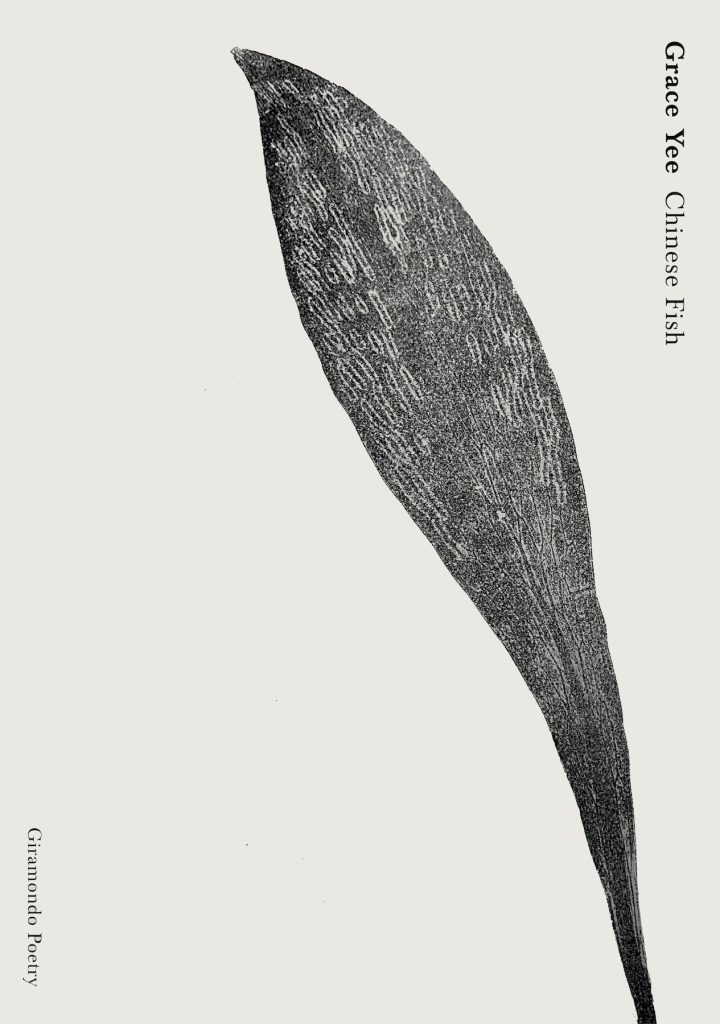
Transcript: Grace Yee at the launch of Chinese Fish
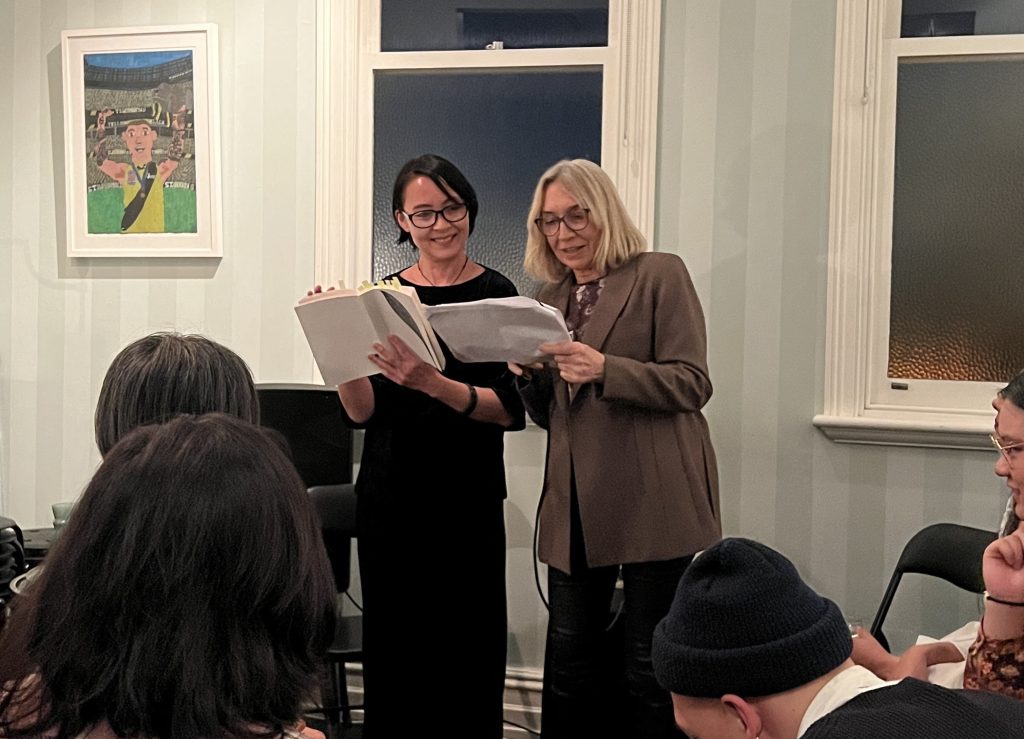
The poetry collection Chinese Fish by Grace Yee was published in June 2023, and celebrated its launch at The Alderman in Brunswick East. A work which ‘portrays the fractured, multilayered, imperiled body of the immigrant story in a stunning work of genre-bending prose poetry’ (Juli Min), it brings us into the daily lives of a multi-generational family newly settled in Aotearoa, New Zealand, where Yee grew up. The book’s launch speech was written by Marion May Campbell, and delivered on the night by Lisa Gorton. Read a transcript of the speech presented by Yee at the launch below.
Thank you Lisa, and thank you Marion, for your generous words.
I am hugely grateful for Marion [May Campbell]’s support from the inception of this book, which began as part of a PhD project, and for her generous support for my work in the years since.
I am also very grateful to Lisa [Gorton] for editing Chinese Fish – Lisa’s guidance and suggestions, particularly on characterisation and voice, challenged me to think more deeply about the work.
Thanks to Ivor Indyk and the Giramondo team for taking a chance on the manuscript; to Aleesha Paz for extraordinary attention to detail, and Kate Prendergast, for her tireless marketing and promotion.
Thank you, Alison, Saradha, romesh, Manisha and Xiaole, for your kind words and brilliant readings. I feel honoured to be in your company and look forward to reading more of your work.
Huge thanks also to Fran Martin, who supervised the critical component of the thesis that accompanied Chinese Fish; to Ely Finch, for expert guidance on the translations – and the pronunciations!
To Zachary Wong, for the illustrations; to my early readers Alison Wong, Coral Campbell and Helen Gildfind, for reading numerous versions of the manuscript; and to my family and close friends for practical and moral support over the years it has taken to complete this book.
There was a comment that Marion made on a very early draft which has remained with me. It was in response to a series of vignettes that I’d forwarded to her, which were narrated in a single omniscient voice.
The comment was: ‘it’s important that there be levels in the work, that lend a kind of poetic hospitality.’
I love this idea of ‘poetic hospitality’, of openness in a text, of spaces between levels – or layers – that allow readers to visit with the text – to sit with it, to enter, leave and re-enter…
I didn’t strategically create different levels in Chinese Fish, but the more research I did, the more voices I heard, the more I felt that this story needed to be narrated in multiple voices.
So there’s Ping, the long-suffering wife and mother who migrates from Hong Kong to Aotearoa, with her husband; there’s Cherry, the eldest daughter, who has to navigate the space between the patriarchal Chinese home, and the outside Pākehā world.
There’s the serious voice of the scholar, and the colonialist orientalist mainstream narrator, a voice inspired by the archives, that parodies orientalist tropes and stereotypes, which haven’t really changed that much over several decades – the epithets and exoticisations that I grew up with are not so different from the ones I read in late 19th century newspapers, or hear on the street today. Chinese culture has often been described as ‘traditional’, ‘timeless’ and unchanging, but maybe it’s the orientalist lens that is fixed in its stare.
I had a lot of fun playing with the voices in the book: Ping is inspired by my mother and the women of her generation who migrated to Aotearoa as newlyweds to Chinese New Zealand men. The English they spoke was typically ‘broken’ and integrated with other Chinese languages. My mother and aunties spoke Cantonese, Taishanese, English, and occasionally Mandarin, fluently – but often mixed two or three of these together, in the same breath.
We all grew up communicating in this hybrid language that we later couldn’t teach or hand down to our own children, because it was so make-shift, transitional, the kind of bridge that is gradually dismantled over the generations once the family becomes more established in the new land.
I am very happy to have written a little of it down now for posterity, in this book.
I will now read a selection of poems from Chinese Fish, with the assistance of my friend, Coral.

An excerpt from π.O.’s The Tour
Featured here, an excerpt from π.O.’s The Tour, published in 2023. The book is a road trip in verse, narrated by one of a group of Australian poets undertaking a tour of the United States and Canada. π.O. is considered one of the pioneers of performance poetry, and The Tour can be read as a chronicle of its difficulties and triumphs.
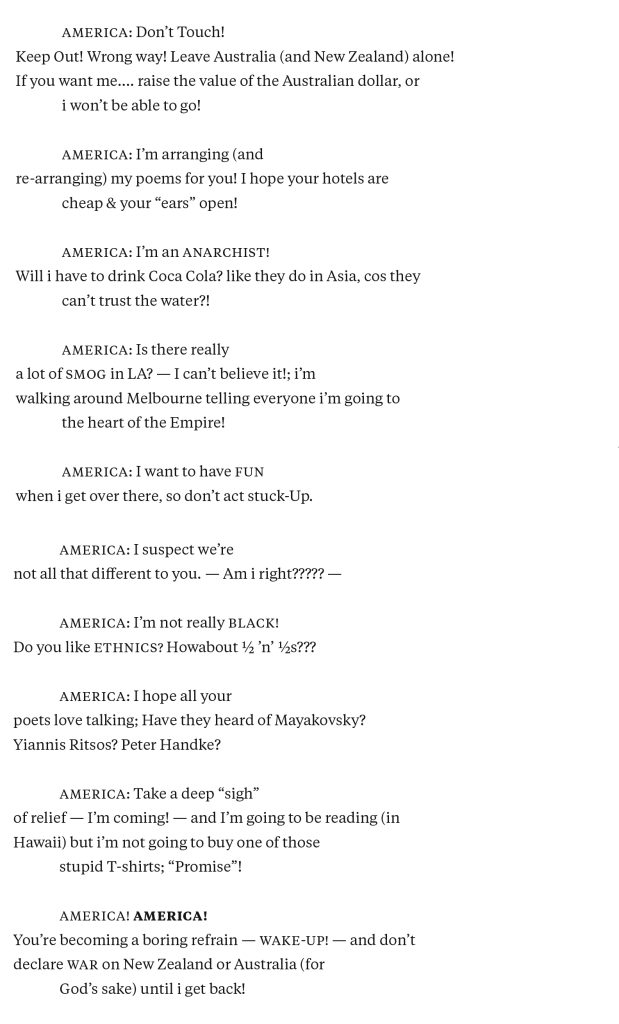
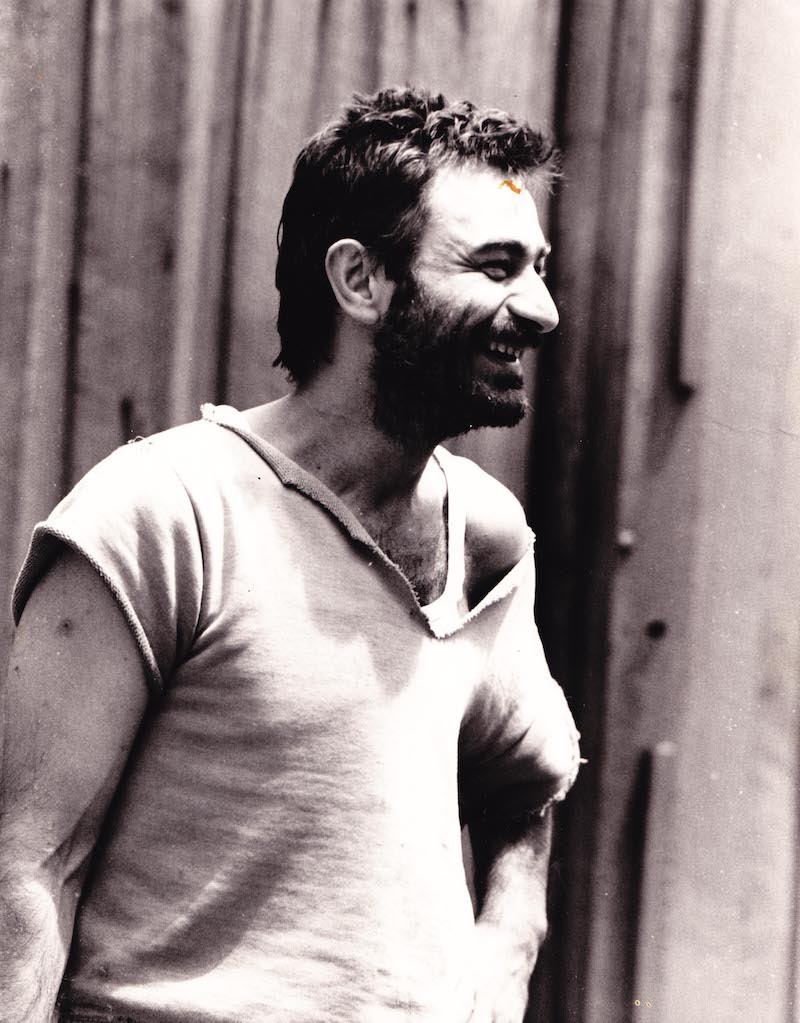
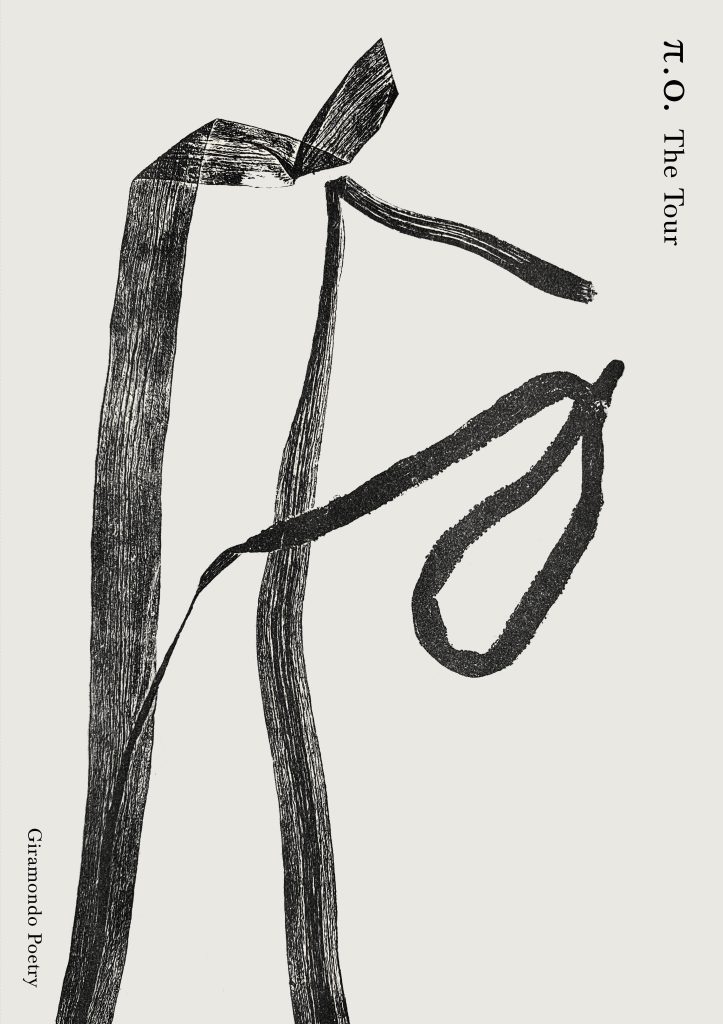
Transcript: Sanya Rushdi at the launch of Hospital
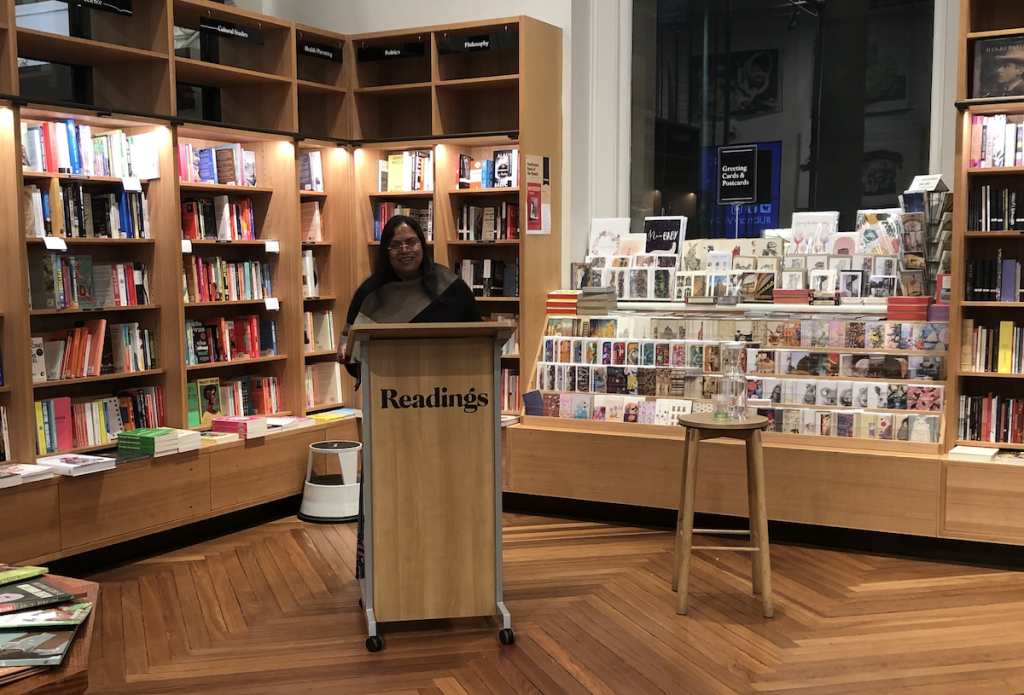
Sanya Rushdi’s debut novel Hospital was published in Australia in June 2023, and launched at Readings State Library in Melbourne. Narrated in the first person, the book is a literary account of a woman living with psychosis, and is based on Rushdi’s own experiences. Read a transcript of the speech presented by Rushdi at the launch here.
Dear Audience,
Peace be upon you!
What a way to spend a Friday night, aye? I mean, you could have spent the night with friends and family. Perhaps watching a movie, or watching Friday night sports or cooking up a big meal for the dinner party. Instead, you decided to be here at my book launch! I am humbled, honoured and grateful. Thank you for making the time to be here.
Let me first warn you of the fact that I am an extremely bad oral communicator. So please forgive my shortcomings.
You may be saying that: “how can that be even possible? You wrote an entire book for goodness’ sake!”
To that, I just want to say that: “Yes, I wrote a book called Hospital, but, as Vygotsky said in Thought and Language:
…the mental functions which form written speech are fundamentally different from those which form oral speech. Written speech is the algebra of speech. It is a more difficult and a more complex form of intentional and conscious speech activity.
Of course, there are differences other than intentionality and level of consciousness between oral and written speech. For example, oral speech usually occurs between two or more people, and the sentences can be left incomplete for the other people to complete them, which, I think forms some kind of mental connection between people, whereas, written speech is usually more expanded and even monotonous.
However, there are different ways of reducing the monotony in written pieces. Written pieces can be written out as different characters speaking to one another, for example. That’s what novels tend to do. They use dialogue, which, I too, have used extensively in Hospital.
In the novel called Hospital, the protagonist receives a diagnosis of schizophrenia after her third episode of psychosis. Psychosis or schizophrenia is something that most people find interesting if not fascinating. It’s one of those colorful illnesses that keep normal people wondering about what’s going on in the affected individual’s mind. There are other, less colorful mental illnesses too, like clinical depression, which is perhaps more devastating and debilitating than most cases of psychosis. Yet, psychosis steals all the public attention – negative attention, to be clear. I experienced both, and want to see one in light (or should I say darkness) of the other.
If there is anyone in the audience who is experiencing, or knows someone who is experiencing some kind of mental illness, know that this darkness does not last forever. It subsides in due time. Often, change starts with something very little, like keeping a diary and writing in it whatever comes to mind. That’s how my writing journey began. During my depression, my elder sister Luna used to ask me write whatever would come to my mind, and afterwards, I could read it out to her if I wanted to. I mostly wanted to, because during major depression, one is in constant need of human interaction. The TV doesn’t do, the internet doesn’t do too much, it’s the actual presence of other people that leads to healing. I remember my younger sister Ifa and her family used to make time to take me out to the beach (which I used to find very soothing) or recite for me from the Quran, or dine with me, or whatever they could, to keep me company. I remember Ifa’s sister-in-law Farhana Snigdha and her family visiting me often. And of course my parents, Sultana Rushdi and Ali Ahmed Rushdi, my ex and my extended family did for me what was beyond my imagination, beyond what I could ever expect! But I just want to say that even if you can’t have all the support that I had, just starting from something very little is often the start of big changes.
Hey, I never thought I’d write a novel. But it’s the writing habit that I built up by keeping a diary, together with the help and encouragement of my beloved Tanvir Ahmed Chowdhury, my publisher and friend Bratya Raisu, and my friend Monzurul Ahsan Olee that led to the completion of the original, Bengali version of this novel called Hospital.
So, how did I go about writing the novel? A couple of months after returning home from the hospital, I became very eager to share my story with a caring ear. So, I gave a few pages of writing to a friend of mine, Bratya Raisu, who is a publisher and editor for a couple of online magazines (and also a renowned poet, writer and artist). Raisu asked me to develop my story into a novel, because he thought it had all the material for a good novel. I was hesitant to start writing a novel so he asked me to give him some chapter headings – just one to two lines of what can be expected in each chapter. I did that, and upon writing the first chapter, it was published in shahitya.com, and subsequently chapter by chapter there. Although I didn’t end up sticking to the chapter headings, it was a rough guide to start with. Each chapter just flowed from the last spontaneously and naturally afterwards.
Later, after the book was published in Bengali, my elder sister Luna sent a copy to Arunava Sinha, who is a friend of hers and is a renowned translator in India, the UK and the US. Arunava read the book and expressed interest in translating it into English, which was a very humbling and happy experience for me. Translating, at his level is a big thing. I’ve read somewhere that ‘writers write for local readers, whereas translators translate for universal readers’. Following Arunava’s translation, the novel received international attention. The English version of the book was published by Seagull Books, and the wonderful Giramondo Publishing Company in Australia, working with whom – my publishers Ivor Indyk, Evelyn Juers, Nick Tapper and the entire team including Kate, Aleesha and others who are working behind the scene, has been an absolute pleasure and honour!
As shown in the novel, psychosis can occur without depression and vice versa, just like obsessive compulsive disorder (OCD) can occur with or without anxiety disorder. Although mainstream psychology and psychiatry do study the aetiology of different mental illnesses, they do so in fragmented ways. Vygotsky compares this method to studying a fragmented water molecule. As we know, a water molecule is composed of two hydrogen atoms and one oxygen atom. Both hydrogen and oxygen are combustive in isolation, but when they are within a water molecule together, as H2O, their characteristics change. Indeed, the characteristics of a water molecule is completely different to that of its isolated atoms.
I think, in a similar way, the different mental illnesses can be compared to see whether they occur together in certain personalities and mind sets, races and nationalities etc., and in cases of multiple mental illnesses, and multiple incidents within a person, how they develop from one illness to another and what happens in-between the incidents other than just ‘resistance to medication’. I think the aetiology of mental illnesses should be studied using more non-mainstream, naturalistic and qualitative methods.
Looking back at my own experiences, I found that in clinical depression, I felt as if I was unable to do the things I previously enjoyed, because there was an internal block that excluded me from feeling any pleasure. Time passed very slowly and there was a frequent thought of death, not because I was grieving something, but because I felt no pleasure in anything at all!
Psychosis is a bit different to clinical depression. For example, during my three incidents of psychosis, time passed so quickly, that I felt as if I could not keep up with the “tasks that needed to be done.” This speed of passing time, however, did not happen from enjoyment, but from a constant agitation, restlessness and irritation due to a feeling of persecution in my first two incidents and a feeling of responsibility and accountability in the third. The last incident seemed to be without much agitation and restlessness, as was shown in Hospital.
So, in psychosis, one feels as if one is unable to do the things one enjoys or thrives in because there is an external pressure of some sort to do otherwise.
But wait a minute. Doesn’t this description of psychosis apply to life in the present world in general too? Is mental illness and mental health a matter of two different languages used by the ‘normal’ and the affected individual? That’s something that Hospital hints at, and it is for you to find out.
Thank You!
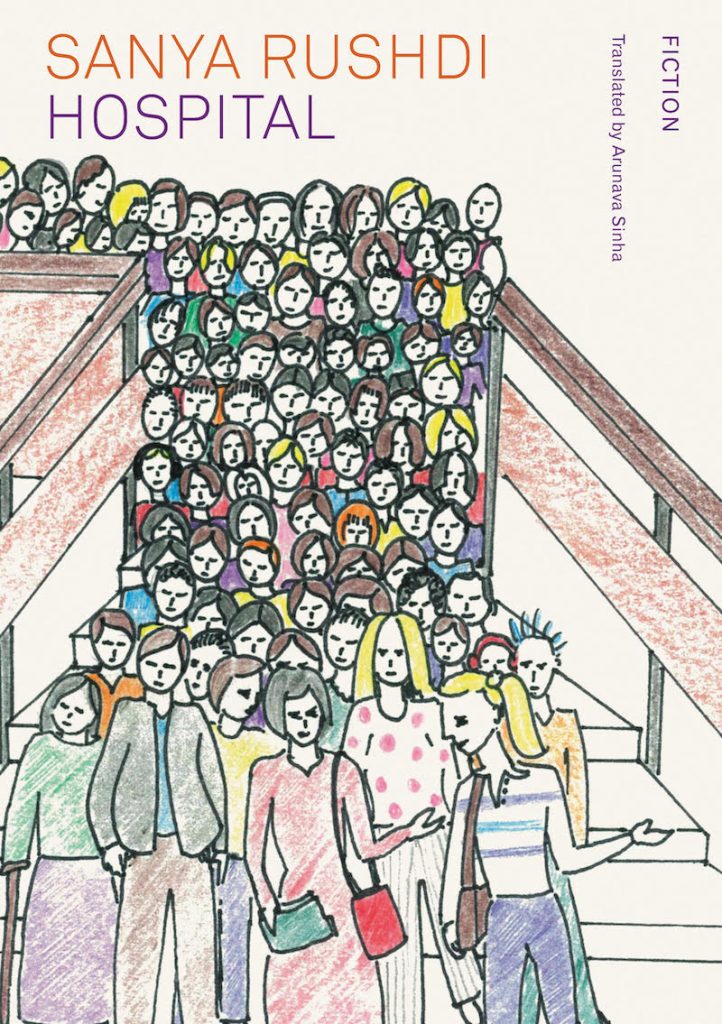
Transcript: Adib Khan launches Hospital by Sanya Rushdi
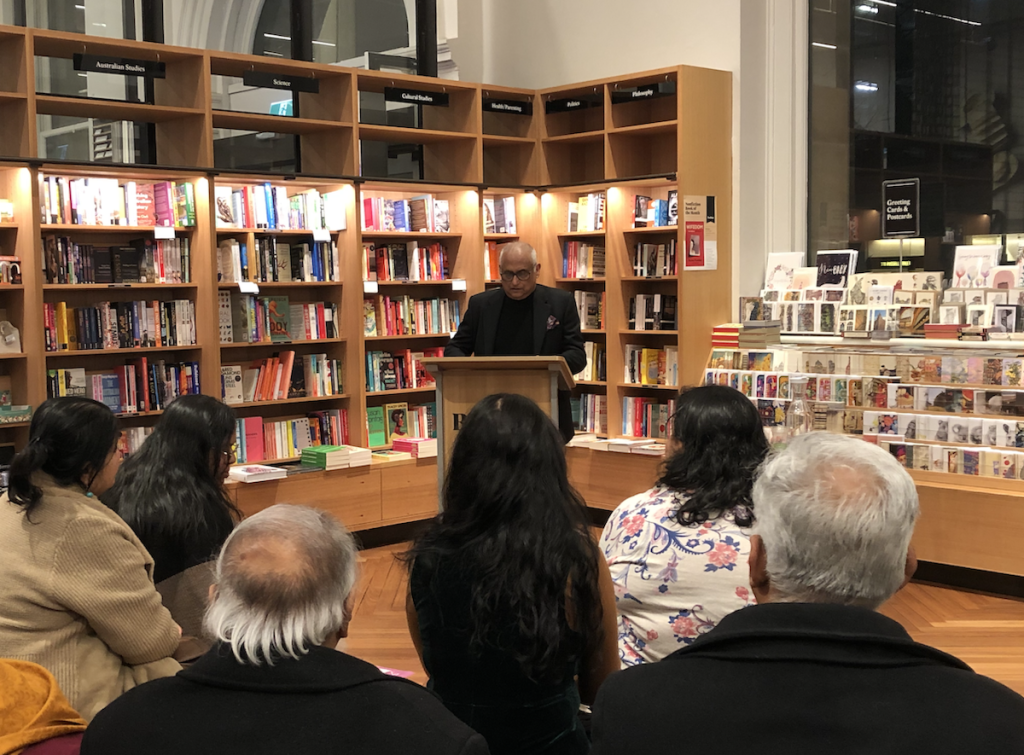
The acclaimed novelist Adib Khan launched Sanya Rushdi’s debut novel Hospital in July 2023. A transcript of his speech is published here.
What reality often hides or obscures, literary fiction frequently reveals as the unacceptable truth. The best in serious fiction jolts us into a realisation that there is a glaring discrepancy between the perception of living in a free society and the punitive reality of restrictions and rules which must be obeyed for a community to function within its social and political structures and without too much disruption. The truth is that an artist often has to contend with a flawed and gashed humanity. And this is what we confront in Sanya Rushdi’s novel, Hospital. As readers of this novel, we have to brace ourselves and engage emotionally and intellectually with words and ideas which are sharp and prickly. They are more than likely to offend our sensibilities, shake our values and challenge those conventions around which we build our lives. A meaningful novel compels us to feel and think. It can make us uncomfortable. There are those who believe in the virtues of a ‘feel good novel’ as the definitive measurement of quality literature. I don’t happen to be among them. I want to be prodded and to be made uncomfortable by what I read. Perhaps it is a form of cerebral masochism. The ultimate stimulant of the reading experience is a series of questions which crop up as the narrative unfolds but for which there are no reassuring answers. This is what happens when you read Rushdi’s novel. Acceptance does not mean resignation. That is one of the fundamental issues explored in Hospital. There is not always a single way to treat those with mental health issues. A civilised society is also compassionate and broad-minded and it is a moral imperative to approach those people who need help in the way that is best for them, offering understanding and inclusion, listening to their concerns and the ways in which they want to be treated. Unfortunately, this is not always the case.
One of the striking features of Hospital is the clarity and succinctness of the narrative. Often Rushdi uses short sentences without too many embellishments of figurative language. The language is bone dry. There are no distractions or deviations, no flourishes and no extravagant metaphors or similes. The stark simplicity of expression enables us to freely explore her inner world of turmoil and her perception of a threatening world out to get her. We learn of her fear of ‘pigeons, dogs, cats, moths, cockroaches – anything that moves.’ She is afraid of anything coloured brown. Most computers, by her reckoning, are for the purposes of monitoring and control.’ She is fearful of mobile phones and the harmful effects of radiation. She doesn’t feel safe in institutionalised living and constantly expects a mishap at ‘any moment, a robbery or murder or kidnapping.’ This paranoia underlines her insecurity which is at the core of her problems. We are not only privy to Rushdi’s inner world but also the hierarchy of the community house where we see well-intentioned professionals, seemingly dedicated to the welfare of the patients but narrow and insular in their belief of what constitutes effective treatment.
There are parallel worlds fictionalised in Rushdi’s novel. We read about those human fallibilities which plague society at large. But somehow, they take on a more sinister dimension when they are presented within the confines of a limited community life. It is hardly surprising that bigotry and racism are manifested in the common activities of everyday living, even among those who are frail and need help. There are moments of brutal insensitivity in every day living as in the scene where the protagonist refuses to eat chicken parmigiana because there are bits of ham in it. Some at the table find this adherence to her Islamic belief funny and burst into laughter. But Rushdi’s emphasis is on mental issues themselves. It is not easy to confront and acknowledge the anguish of a mentally ill person. Consistent throughout the writing is Rushdi’s resistance to the controlling forces of a system which treats her with its myopic dependence on medication. Hers is a struggle for the retention of an independent mind and the right to question the treatment she receives. The defects of a social system which supposedly represents the best and most advanced in medical science are exposed in her conversations with the experts who attempt to help her. What the medical practitioners do not understand is that despite Rushdi’s problems she is quintessentially an ordinary human being with ordinary human needs. She has needs common to everyone in a community. She has sexual desires, she longs for love and compassion and emphasises the importance of communication. Medical treatment is the least of her priorities. ‘All I need,’ she says, ‘is proper help, based on conversation, not medication.’
The sustained tension in the novel is primarily the result of the first-person narrative which takes us close not only into Rushdi’s inner world but also into a community house where we come across professional medicos seemingly dedicated to the welfare of mentally ill patients. There is an ongoing struggle between those who seek to cure and those who are subjected to the treatment which modern medicine offers. One of the main aims of the treatment is to stabilise and promote self-control. Dr Wong directly addresses what he perceives to be Rushdi’s problem. ‘Your mood isn’t stable,’ the doctor tells her, ‘you have no control over yourself.’ Rushdi sees the attempt to manage her as an extreme form of repression. ‘The self,’ she says, ‘is subdued with medication at every opportunity.’ In Ken Kesey’s groundbreaking 1962 novel, One Flew Over the Cuckoo’s Nest, one of the mental patients, Dale Harding, observes, ‘In this country, when something is out of order, then the quickest way to get it fixed is the best way.’ And this attitude is prevalent in Hospital. Rushdi’s novel is not only an exposure of the inhumane way that mentally ill people are frequently treated but also a plea for help. Her cry is for someone who ‘is in possession of both common sense and compassion.’ And that compassion is a healer. It is ‘based on conversation, not medication.’ Rushdi argues that there is not always one way to treat those with mental health issues. We, as a society, must do our utmost to approach and treat people in the way that is best for them. We must offer understanding and inclusion. The institutionalisation of those who are mentally ill and the reliance on modern medicine as quick-fix curatives are crucial concerns in Hospital. They represent the oppressive mechanisation, dehumanisation and emasculation of those who do not fit the perceived norms of society. One of the residents pleads his case to Russell, the bodybuilder: ‘I am a human being and you have to treat me accordingly.’ It is the supreme irony of the novel that in a free society there should be institutions which exercise such cruel control of individuals even as they try to liberate and cure people shackled by their mental conditions.
The novel opens and closes with a focus on art. The media res opening of Hospital lulls us momentarily into a state of calmness as we are invited to examine some of the details of Claude Monet’s painting, Bridge Over a Pond of Water Lilies. We wonder why the narrator suddenly decides to sketch what Monet has painted. In itself Monet’s picture not only captures the calm beauty of nature but also sends a powerful message about finding a balance between human existence and our environment. But very quickly, the sketch moves in a different direction because within herself Rushdi does not find any compatibility between her inner chaos and nature’s calm beauty which characterises Monet’s painting. There is a pond within which is an island connected to the mainland with a bridge. Its last step leads us to a lotus. Much later in the book, as she sits by a window and observes the changing weather pattern, Rushdi discloses that ‘There have been storms outside throughout, the state of my mind matching the state of nature to provide some sort of consolation.’
By the end of the novel we return to Rushdi’s picture which she sketched three years previously. If ever, Samuel Coleridge’s famous line about the Willing suspension of disbelief was applicable to a reader, then it comes into effect in the last page of the novel.
There is calmness in the scene which Rushdi describes at the end of the novel. But there is also a sad realisation of the inevitability of another attack of psychosis at some future point. That does not dampen the hope of healing by not using conventional medical therapy. The sketch based on Monet’s painting is eventually fashioned after Rushdi’s own needs. There is gentleness, love, harmony and communication. There is something mystical and elusive but ultimately fulfilling about the book’s ending. We return to the island connected to the mainland by a footbridge where trees grow and flowers bloom. Among the intertwining trees, there is one that stands apart. The lotus is still there except now people talk to it. Man and nature appear to synchronise as an alternative process of recovery and living together. There is unfettered growth which complements the mind’s endless search for the self. The solitary tree continues to grow until its top almost touches the clouds ‘where the birds fly.’ It brings to mind what Henry Beecher, an American clergyman, said: ‘Every artist dips his brush in his own soul, and paints his own nature into his pictures.’ Above everything else, Hospital teaches us about the irrepressible condition and the resilience of the human spirit and what it means to be human. Hospital is a very fine novel which gives us much to think about. I urge you to read it. It is with great pleasure that I launch Sanya Rushdi’s debut novel. Thank you.
— Adib Khan

A poem by Louise Carter from Golden Repair
Featured here: a poem by Louise Carter from her debut 2023 collection, Golden Repair.
You waited for me to turn up and then when I did
we said yes to each other almost immediately
and the roof disappeared from your Lotus Elise
the sky so ecstatically blue
every pop tune a hymn.
What men really want is a classy freak
a guy on Oprah once said as the audience cheered
and it was not foolish to think ourselves invincible
because you are when you look love straight in the eye
and wink. You teased me that time when we kissed
and you felt what I was feeling
and you said which one of us will say it first?
before teasing we could say it at the same time
as I flailed and squealed all that joy
bunched up like a painful sneeze.
Blueness a gas flame in that hot summer
and sunlight abundant, abundant
in the blue time of brightness
that stretched upwards and through us forever
a bright blue thread through our hearts and heaven.
